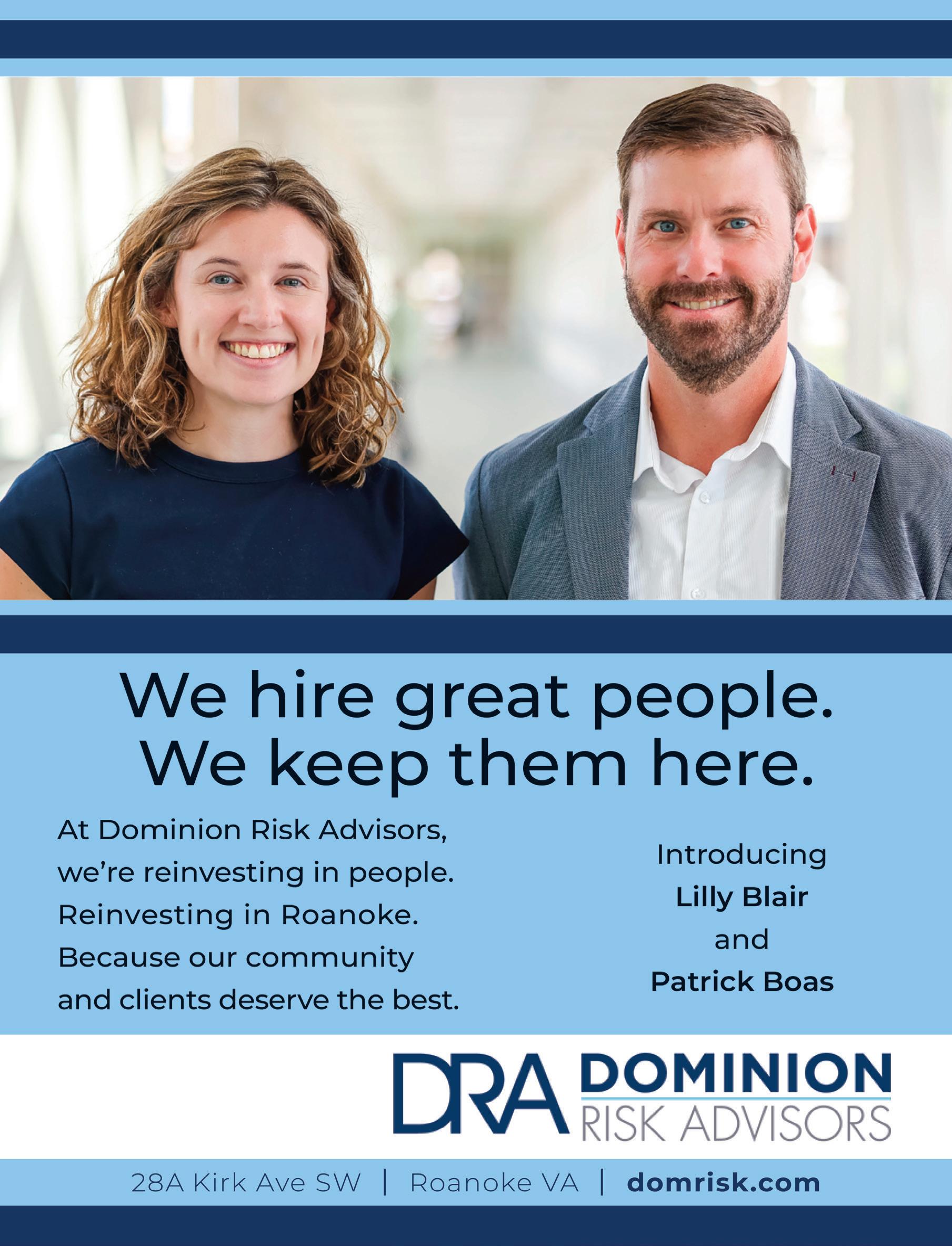




There are so many fisherman jokes, we’re not even going to try and throw a line here— you’ve probably heard it. We’ll just say our net is full for your November FRONT catch. Besides the microbusiness featured on our FRONTcover, our haul includes a real estate / hospitality opening with a vintage vibe; the new head of our Community Foundation in Roanoke; new management at a popular foodie bistro; a new high school for adults; an organization helping those struggling with substance abuse; and a warehouse where you can nab brand new items that were returned or unsold.
Oh, alright, we’ll conclude with this. We hope your FRONT this month is useful to you. Not like the fish with no tail. It was rudderly useless.
Tom Field
Gene Marrano Publisher Editor
You don't ever have to be alone again. — Page 61 “”


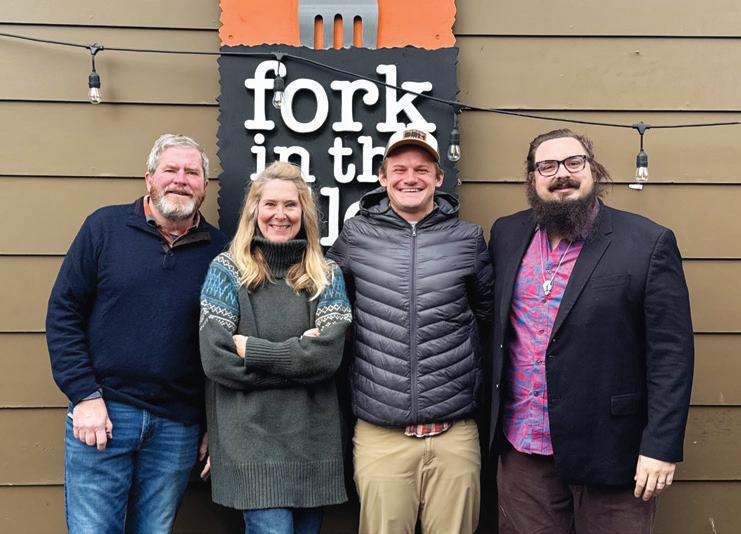
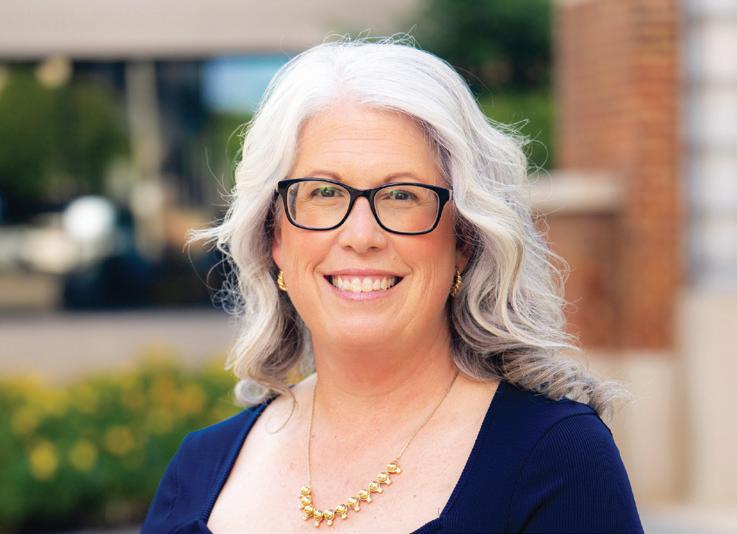




P.O. Box 1041
Salem, VA 24153 (540) 389-9945 www.vbFRONT.com
Publisher / Tom Field
Creative Director tfield@vbFRONT.com (540) 389-9945
Editor Gene Marrano news@vbFRONT.com
Advertising Dan Dowdy (540) 797-7943 ddowdy@vbFRONT.com ads@vbFRONT.com (540) 389-9945
Graphic Design Nicholas Vaassen
Office Administration Emily Field info@vbFRONT.com
Production Berryfield, Inc. PO Box 1041 Salem, VA 24153 (540) 389-9945
Advertising ads@vbFRONT.com
Subscriptions info@vbFRONT.com
News / Releases news@vbFRONT.com
Admin / Ops info@vbFRONT.com (540) 389-9945 vbFRONT.com morefront.blogspot.com
© Copyright 2025; Valley Business FRONT, LLC. All rights reserved. Reproduction or use of this publication in whole or in part without written permission is prohibited. Information within Valley Business FRONT is obtained from sources considered reliable, but cannot be guaranteed. Opinions expressed are not necessarily those of the ownership. Valley Business FRONT is primarily distributed to subscribers by mail, digitally and select locations throughout the Roanoke Valley, New River Valley, and western Virginia.




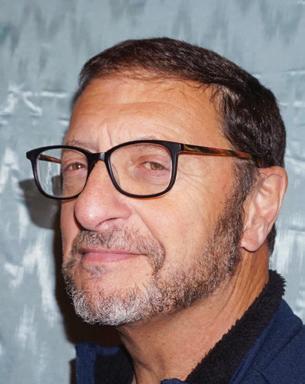

Valley Business FRONT has organized an Advisory Board comprised of a selective group of diverse business professionals who support our mission and have an interest in how our business journal best serves our local communities and region. As a sounding board throughout their term, board members have been given the task of helping FRONT understand the issues and develop coverage. You will note that the Board is comprised of experts in many different business / industry “fronts.” This is intentional, as we are reporting on all the areas that affect our regional economy and are important to you. Although the members are encouraged to keep FRONT updated on their own industries and the key players, they aren’t limited to their area of specialty, as all commercial enterprises ultimately collaborate to impact our quality of life here in this part of Virginia. An additional contribution by the Advisory Board involves direct input on the various FRONTLists we present throughout the year. In keeping with our policy of being “the voice of business in the valleys” we ask each reader to join us as an editorial partner by contacting us with your ideas. You know more than we know about your business—or you certainly should—and that inside knowledge shared with our readers will make us all better at what we do.

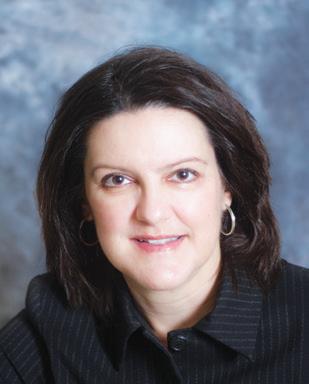



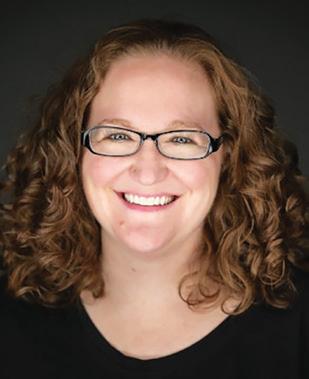


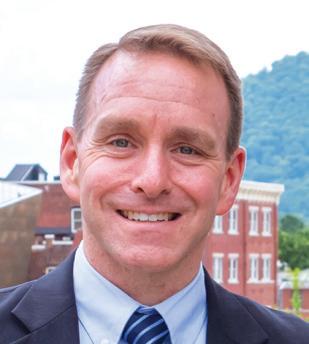
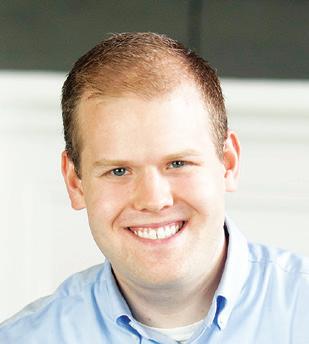
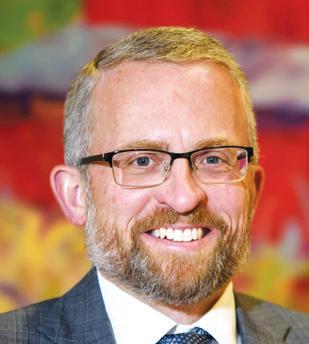
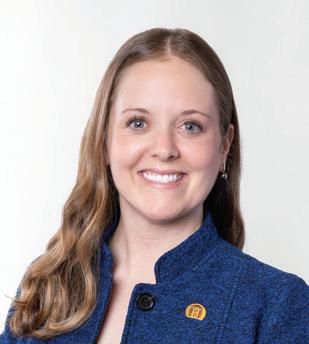
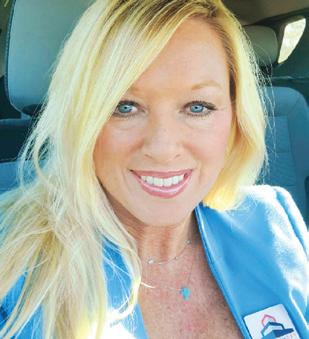

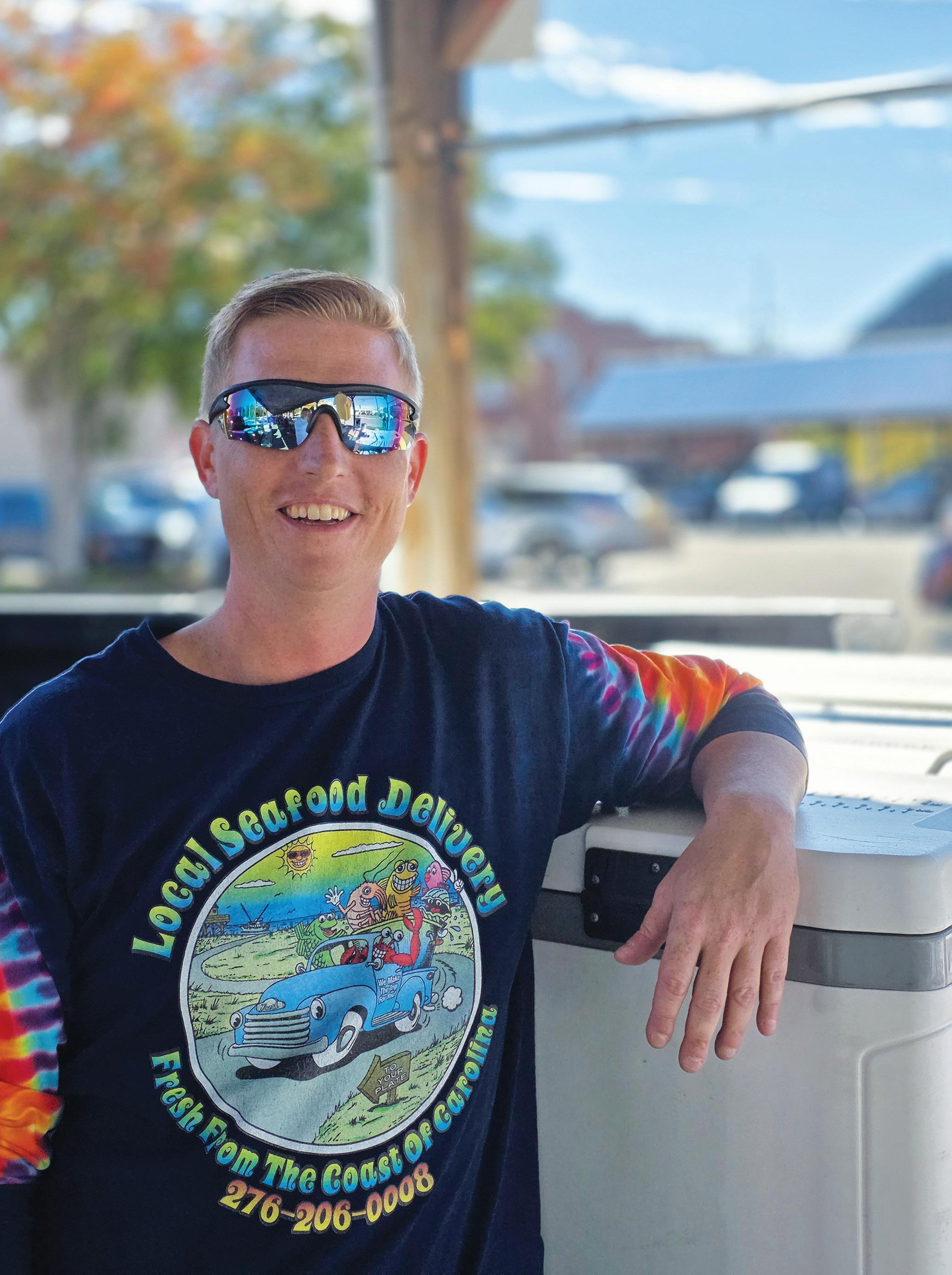
“People
By Tom Field
“Hey, honey… I’m going to run down and pick up some seafood. See ya’ tomorrow.”
That sounds a bit ridiculous for a grocery run, don’t you think? But if you want truly fresh seafood, well, it’s not that easy to find when you live in the rolling hills and valleys of Southwest Virginia.
Meet Charlie Counts. He’ll hook you up.
Huckster. Monger.
Why do these two words sound kind of unpleasant? They shouldn’t. At least not when it comes to the business of Charlie Counts. He’ll gladly step right up and tell you he’s a huckster at your local market. And a fish monger. If you love fresh seafood and wish you could insist on it all the time, you’ll like Counts.
Marion will tell you that.
“I’ve been following Charlie since he started this business,” the frequent city market patron says. And the business—Local Seafood Delivery—hit 15 years strong this year.
“Yep. She’s hooked,” Counts says. “And feel free
“” Put your order in!
“It’s the best,” says Marion, longtime Local Seafood Delivery patron

“” The three S's... [are always popular] shrimp, salmon, scallops.
to use all the fishing references you like.”
“It’s the best,” Marion says, simply. She picks up her order in Salem today, though she used to go to the downtown Roanoke Farmers Market, when she worked in the city.
About that name: Local Seafood Delivery. Could you get a more descriptive name of your business than that? The name says it all. Counts says as a domain name, it feels a little long—but at the same time, it’s rather amazing he secured it. There’s no question about what he does.
Most of the business is based on four essential parts: the drive; the source; the markets; and the website.
“It’s about a 12 or 13-hour day.”
That’s how Counts describes his weekly run to the shores of North Carolina. Specifically, Topsail Island. More specifically, Surf City Crab market.
“It’s 297 miles from my house,” Counts says.


That’s about a 600-mile round-trip route. He says he used to leave at 5am, but now it’s closer to 8am. Since “the drive” is just about the most important part of his business, he says he has some of his own secret routes, like when I-40 gets backed up, and other high-traffic moments. Even in the lowest traffic experiences, though, it’s a long day.
Counts drives his big Toyota pickup, packed with industrial-grade coolers, to his favorite chosen market, and comes back the same day.
He’ll pick up various “fresh catches of the day” but the majority of his inventory will be those same fresh catches that were pre-ordered from customers here in Roanoke, Salem, Smith Mountain Lake, and the surrounding regions.
If you want to ensure you’ll get what you want, you best place an order. He typically empties out the coolers early on from the random foot traffic that might happen to “get lucky” with product that isn’t already called for.
“Put your order in!” the huckster calls out to customers walking by.
Right now, Counts says the order cutoff is every

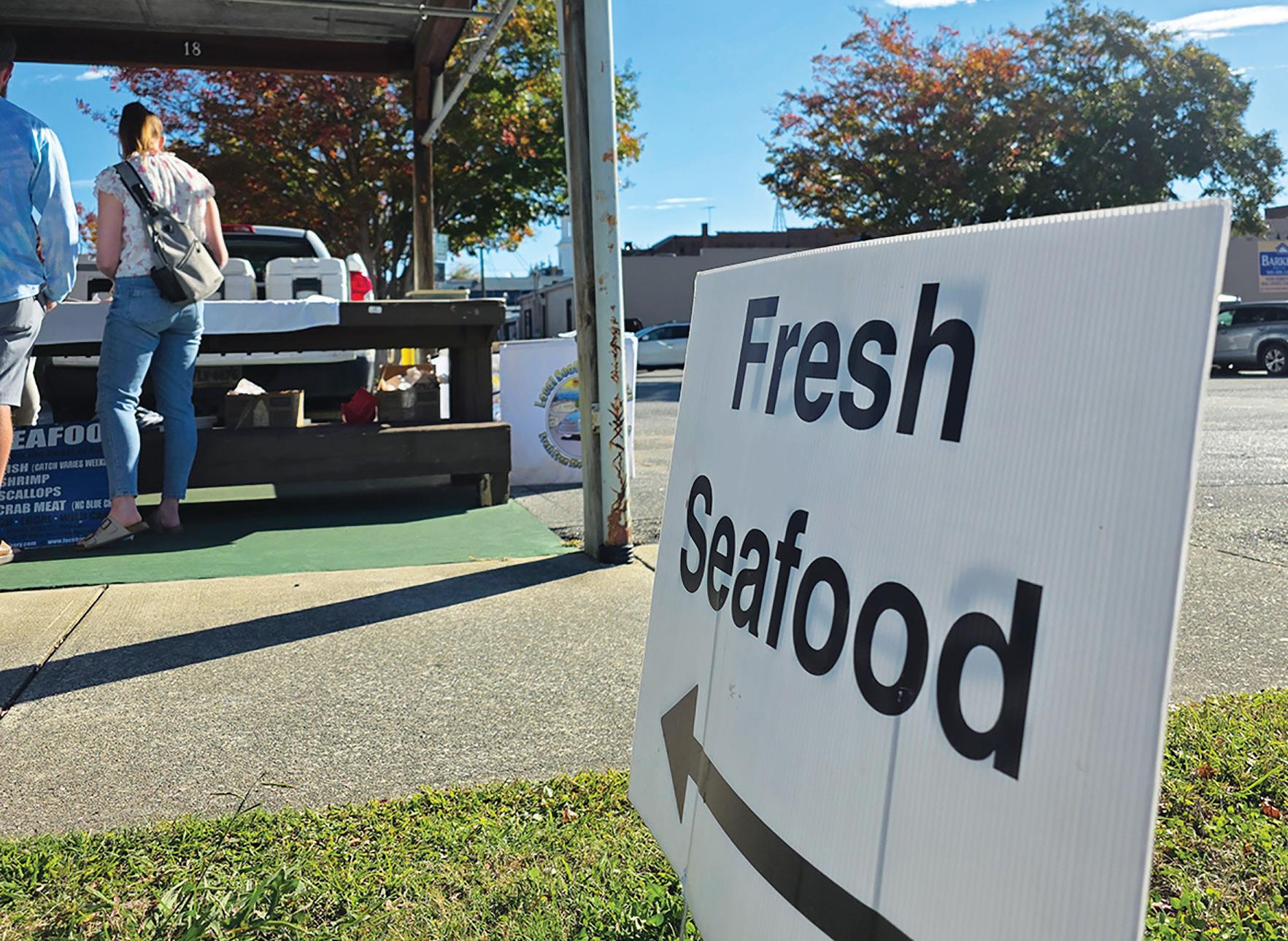



Monday at midnight if you want to get in on the next run.
It’s rather interesting to discover that Counts gets his supply from one fish market. He doesn’t shop around; he sticks to one source.
“Trust” is a word Counts uses frequently.
“I have a good relationship,” he says, describing Surf City Crab, which is a family business. Counts himself, comes from a family business environment—a family farm. He puts stock in that model and considers it an advantage.
“You could say [with his seafood enterprise] that my family and I are now a ‘surf and turf’ family. They have been part of the local food movement for over 20 years, raising Black Angus cattle on the farm where I grew up in southwest Virginia.”
“I have developed a trust with them,” he says about the fish market in Topsail. “There is a transparency with this family that is so important.”

Counts says knowing where and when the fish is caught means everything. It certainly applies to the local catches and harvesting, but he even gets the “fresh stats” from fish outside of Carolina waters, whether it’s seabass from Chile or arctic char from Iceland (or other favorites).
How did Counts find his special fishing spot? It’s an interesting fishing tale, for sure.
“Back in 2010,” Counts begins, “we had a family beach trip to Topsail Island. We loaded up our cooler with fresh, locally caught seafood, and brought it to The Harvest Table restaurant in Meadowview, Virginia—where my dad sold our Black Angus cattle, and where my mom and brother worked at the time.”
You guessed it. The seafood was “a big hit,” Counts says; and “that’s when the lightbulb went off in my head.”
He decided to bring fresh, local seafood to restaurants and individuals in the Roanoke Valley.
“People deserve to eat the best; and they deserve to know where their food comes from.”
Counts was hooked on the business idea.
“” My family and I are now a surf and turf family.

He hoped to hook customers on it.
Local Seafood Delivery is operating in its 16th year.
It caught on.
“” I pack it on ice and turn right back around to Virginia.
Counts brought his Local Seafood Delivery business to the historic Roanoke City Market first. That was in the spring of 2011. He also supplies local restaurants and other market venues, including those established in Roanoke County, Salem, and Smith Mountain Lake (at Westlake).
His offerings include some regulars in the lineup, but he’ll change it out based on the supply (and demand). Counts says the reason you might not see a particular fish on the catalog at any given time is because various factors impact the supply—regulations and seasons are at the top of that list. Sometimes, it’s the fish migration itself. This week, for example, Counts says there wasn’t a lot of mahi-mahi.
As of the date of this report, his “store” features shrimp, oysters, scallops, crab, char, haddock, salmon, cod, trout, flounder, red drum, seabass, and grouper. The stock changes week-to-week.
That’s what fresh, locally caught means.
“The Three-S’s…” Counts says, are always popular: shrimp, salmon, scallops.
“Shrimp is America’s most eaten seafood,” he says.
Prices are usually set per pound; and customers have options such as skin on or skinless, whole or fillet.
“The dock fillets your order, I pack it on ice and turn right back around to Virginia. Your seafood has never been frozen” (though you can certainly freeze it yourself for later).
Counts preaches that you should “get to know your producer” when it comes to your food sources. He encourages questions.
“Ask me,” he says. “It’s time to meet your monger.”
The best way to experience Local Seafood Delivery is by making an order at the website… not surprisingly: LocalSeafoodDelivery.com
Once you pick your seafood, you have the option of selecting the local market where you’ll pick it up (with the date provided). You’ll pay for your order, get confirmation, and then it will be waiting for you on pickup day.
The website is easy and interactive, showing you the market and its hours of operation, the date, as well as the number of days between your order and your pickup.
No bait-n-switch.
You can tell Charlie Counts loves his business. From his colorful Local Seafood Delivery shirt to his signature mirror sunglasses to the matching, neatly stacked coolers, to the signage and his singsong call outs and interactions with customers… even the bugs plastered on the front of his hard-ridden pickup truck… all of these visuals are signs that he enjoys his work.
A happy huckster.
A masterful monger.

“” Ask me [about seafood]... it's time to meet your monger.
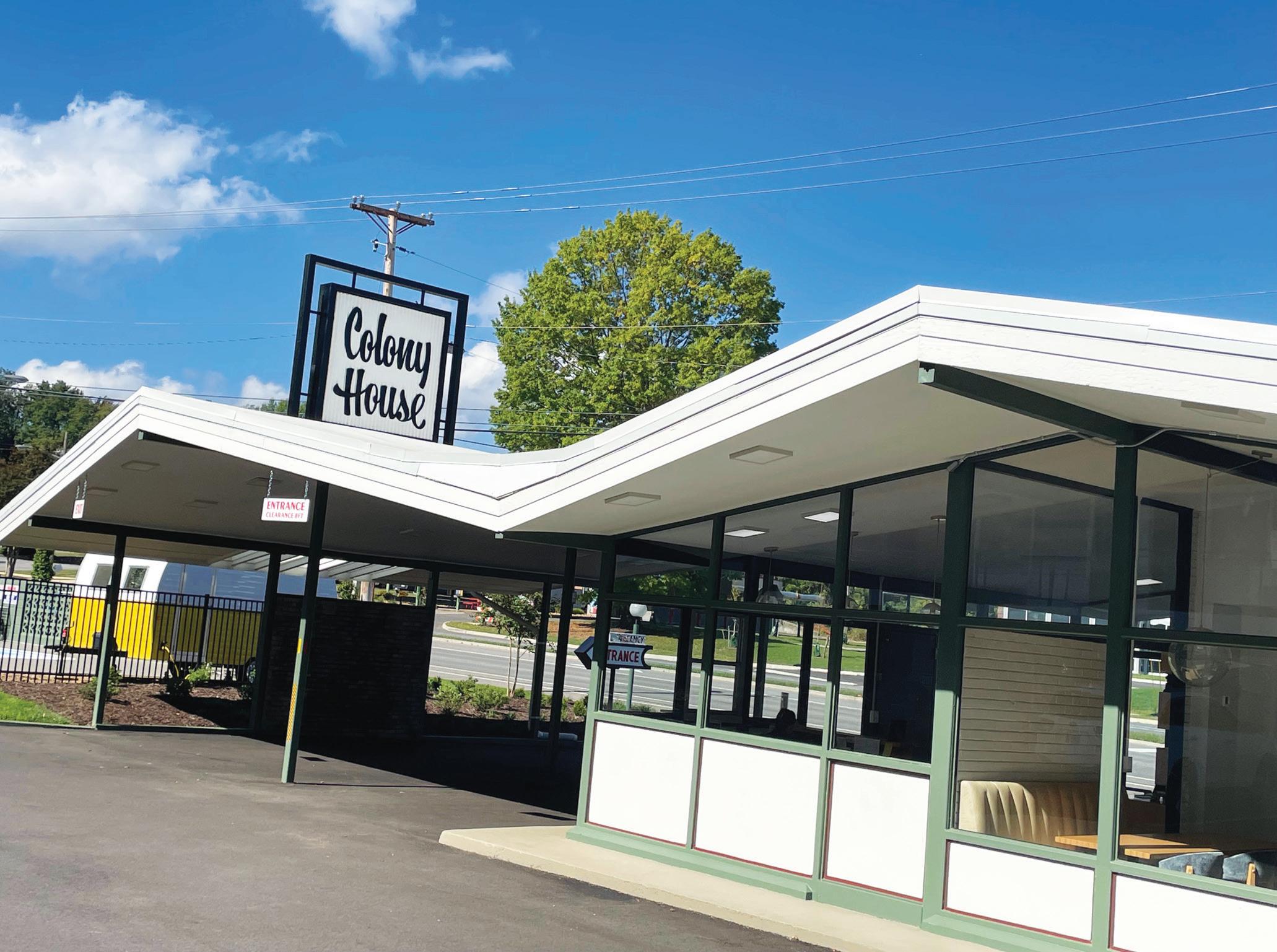
By Gene Marrano
Step back to The Jetsons—and the 1950’s/60’s vibe.
Travelers have been staying at the Colony House Motor Lodge on Franklin Road in Roanoke since the 1950's. It closed in 2018 when the owners retired. That's when Bruce Farrell, the owner of Berglund Automotive purchased it.
“There are vintage pieces in a lot of the rooms; of course, really nice mattresses and sheets… everything you would
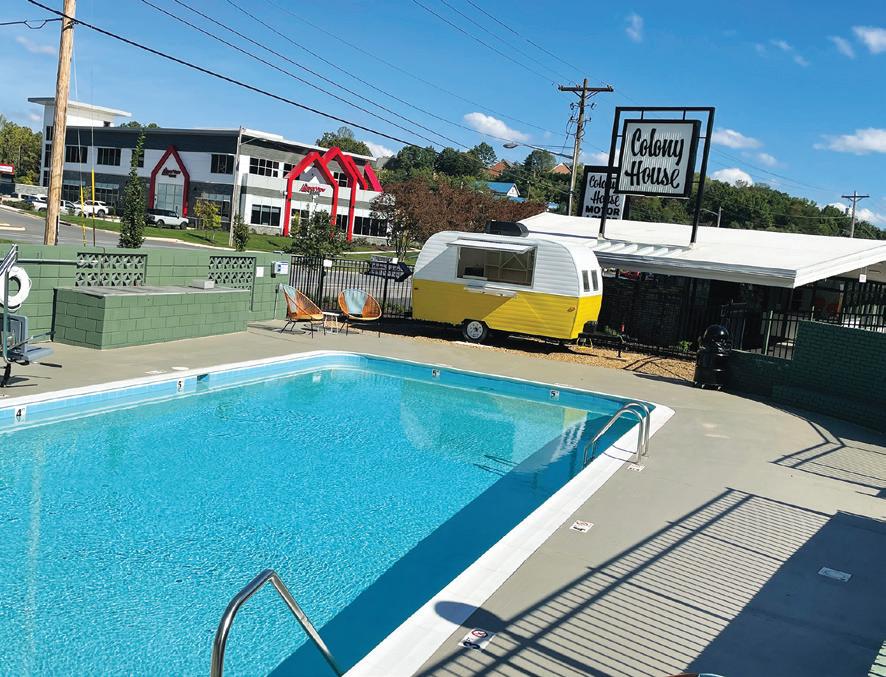
expect from high end hotel rooms,” says Mike Farrell, Bruce’s son, at the reopening ceremony.
Colony House is also on the National Register of Historic Places; so there was little the Farrells could do on the outside, where the roofline was designed in the 50’s to suggest the Blue Ridge Mountains. They kept the retro feel on the inside of the 67-room


property as well, with all the amenities you'd expect from a higher-end hotel.
Colony House General Manager Joy Barlow likes the fact that it is a unique boutique hotel.
“Travelers are drawn to it because of the retro vibe, the theme in the rooms, the theme with the outside of the hotel, with the pool,” Barlow says. An old-time Shasta-style camping trailer can be used for beverage and food services in the pool area.
Along with Mike, Bruce Farrell’s wife and daughter adopted the project, and the
younger Farrell says the three worked together to appoint rooms with what current travelers expect, while maintaining the retro feel.
“It’s a great building, it’s beloved in the community.”
The Colony House also has a refreshed meeting space. Plans for next year include outdoor music events open to the public. It had a soft opening in August and welcomed cyclists participating in the USA Championships Roanoke hosted this past summer. A ribbon cutting took place last month.

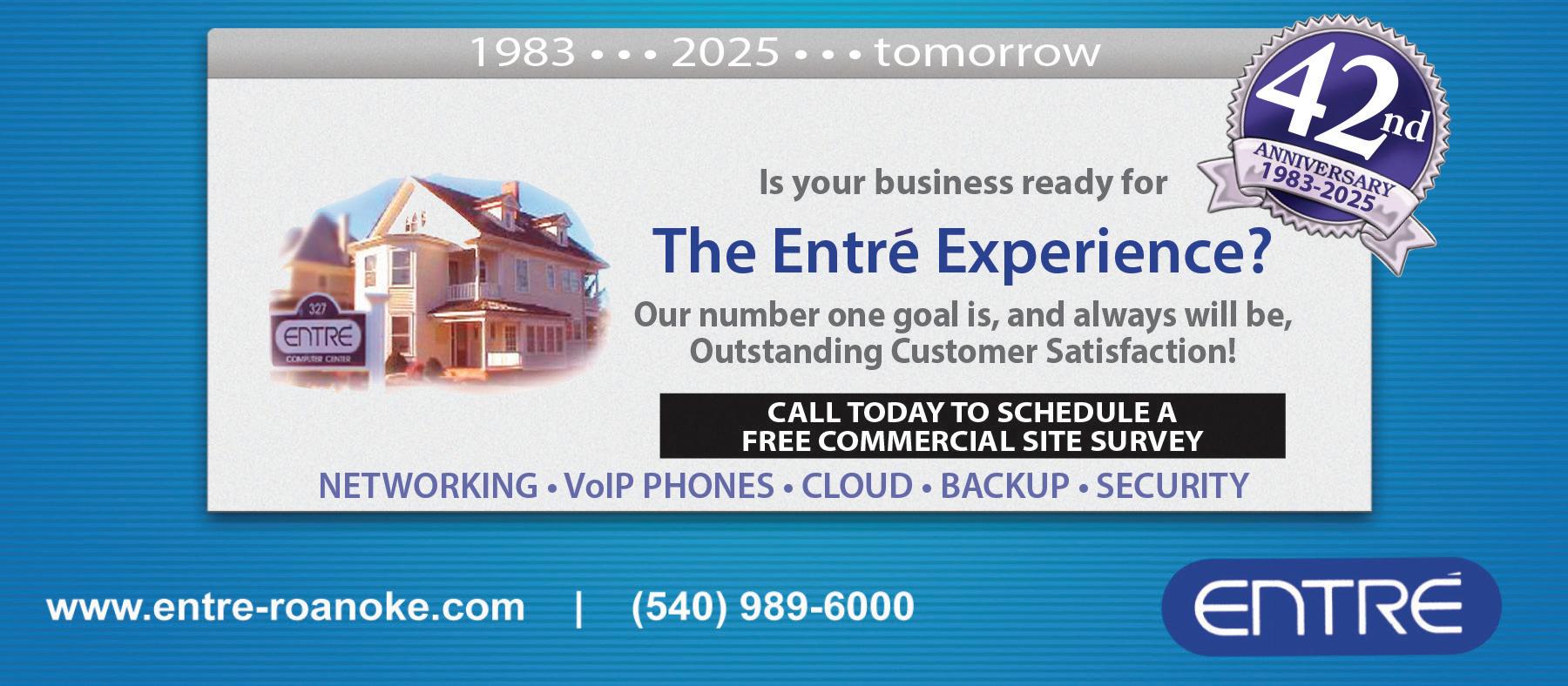

By Carrie Cousins, Lead Point Digital
Executive Summary: You’ve probably read all kinds of things about how artificial intelligence can help – or hurt – your marketing efforts. This is not a black of white issue; using AI in marketing can be beneficial when used with consideration and understanding.
Unpopular opinion: AI can enhance creativity. Let me explain. When used as a tool to help brainstorm, see what ideas are already out there, or quickly sketch a concept, AI can be a great tool to help you think creatively faster. Think of it as a virtual brainstorming assistant that can help you walk through ideas or concepts.
The caution is that it should not be the end of the process. It’s just an early step in the iteration. With that concept in mind, here are 5 things you need to know about AI in marketing (and tips for effective usage).
1. AI can be a fantastic copyeditor. Tools such as Grammarly incorporate smart syntax suggestions to help you improve writing and even serve as a second set of eyes when you don’t have a proofer to look over your work. Just make sure to read all the suggestions to ensure you don’t lose brand voice or context.
2. Jazz up a boring PowerPoint with suggested layouts that still fit your design style. Turn on this option using the Home or Design Tab and using “Design Ideas.” Pair this with the 5-5-5 rule for great slides every time: No more than five words per line, no more than 5 lines per slide, and no more than 5 text-heavy slides in a row.
3. Optimize advertising with native AI tools in Google and Meta. Most of the major advertising platforms use propriety AI tools that are designed to help you reach more users with less budget. It is important to use these tools only with a strong working knowledge of your advertising needs and goals; remember the platforms do not understand your goals as well as you do.
4. Map out your strategy with an AI-powered calendar. Many popular tools, such as Notion AI, Trello, and Chat GPT, can help you turn your marketing strategy into a calendar format that helps you turn your ideas into action items. This can save you a lot of time when

mapping out a plan and then you can replicate it. Just make sure your prompts include a plan that you don’t mind sharing publicly and a timeline for your plan. Start with something simple like ideas for planning a week’s worth of social posts, but you can map out months of strategy with the right prompts.
5. Ownership is murky when it comes to using AI, particularly for generated content. The thing that is important to consider with all uses of AI, is terms of the service you are using. Ownership of content generated by AI isn’t necessarily yours, and you can’t claim copyright or trademark for generated materials. There are also questions about public sharing or disclosure when using public, open-source, and free tools. Don’t put any sensitive information into an AI engine that is not owned by you or your company, because you don’t always know who could access it later or if the generative engine will share it in a result later.
I don’t subscribe to the gloom and doom AI scenarios when it comes to AI in marketing. Do I trust it to do the things I want a person to do? No way. But it is a great tool to help you find, distill, and plan with a lot of information with more speed and agility.
AI might just be the best virtual assistant you ever had, giving you more time to think creatively and more strategically.

Think of [AI] as a virtual brainstorming assistant... “”
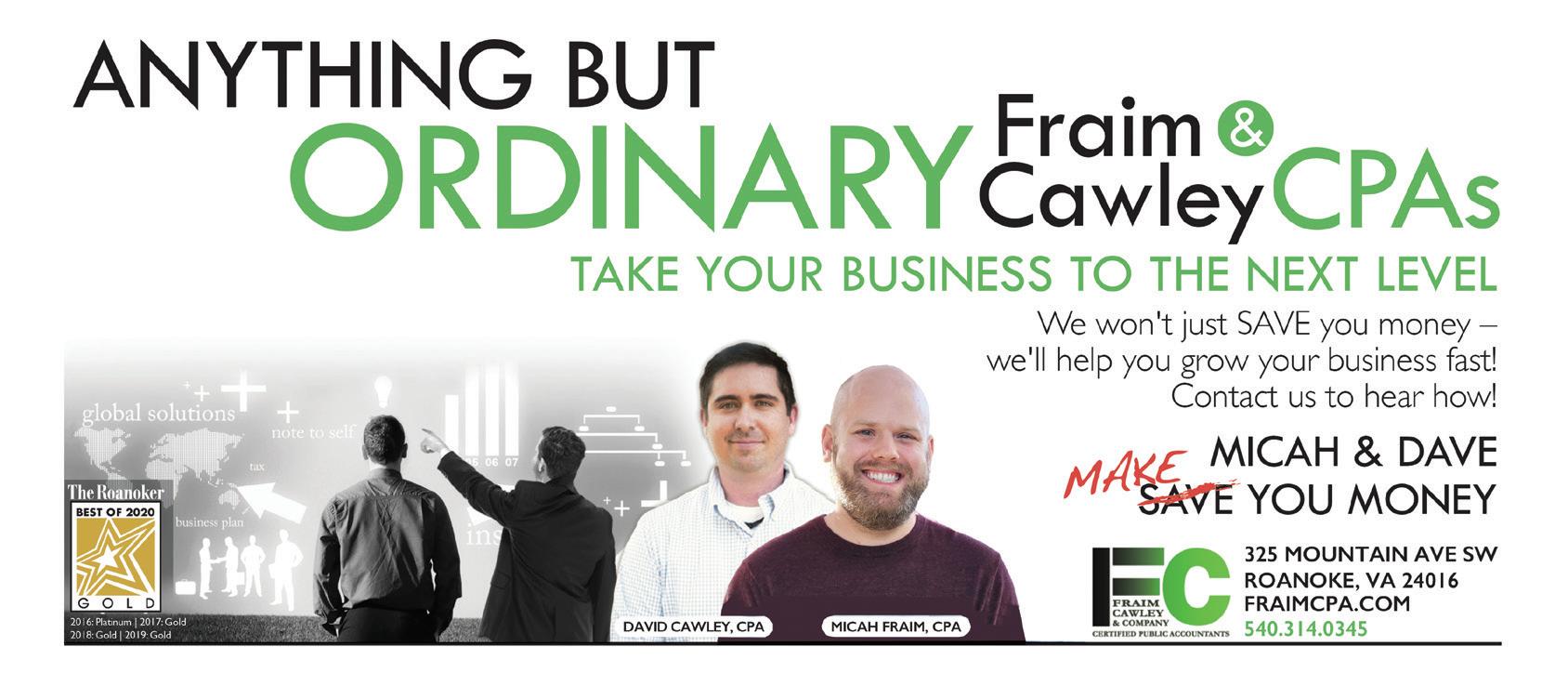

By Aila Boyd
Goodwill Industries of the Valleys has opened The Excel Center at Melrose Plaza, a tuition-free high school for adults who did not complete their diploma.
Excel Center launched its inaugural cohort in August and is designed to remove barriers to education and increase access to workforce opportunities across the Roanoke region.
Melrose Plaza—Goodwill’s redevelopment of its former corporate campus in Northwest Roanoke—was created as a hub for economic mobility services including education, health access, financial literacy, and career support. Adding The Excel Center – a Goodwill program established in other markets - was a strategic decision rooted in Goodwill’s long-term commitment to addressing poverty at its source.
“There are around 15,000 individuals just
in the Roanoke Valley who do not have a high school diploma or a GED,” said Kelly Weems, senior director of Community Impact for Goodwill Industries of the Valleys. “With staggering numbers like that, it just made sense to add this as one of the barrier removals to addressing the social determinants of health.”
The Excel Center model originated with Goodwill Industries in Indiana and has expanded across the country. Goodwill Industries of the Valleys secured the rights to operate the first Excel Center in Virginia west of Richmond, adapting the model to meet regional needs.
“We recognize that it’s not one socioeconomic
factor that contributes to poverty—it’s many things,” said Mindy Boyd, chief operating officer for Goodwill Industries of the Valleys. “So, if we just address one, are we really leaning in hard on what our vision is of elimination of poverty?”
The school currently serves 48 adult students, down slightly from the original 59 who began in the first cohort. Retention remains strong despite the challenges many adult learners face.
“Our students have come with a high degree of enthusiasm and interest in the program and a willingness to take that second shot at their education,” said Bruce Major, school director at The Excel Center. “Life still happens for our students, but we’re retaining 81% of our students thus far in this first term.”
Roughly 80% of current students are
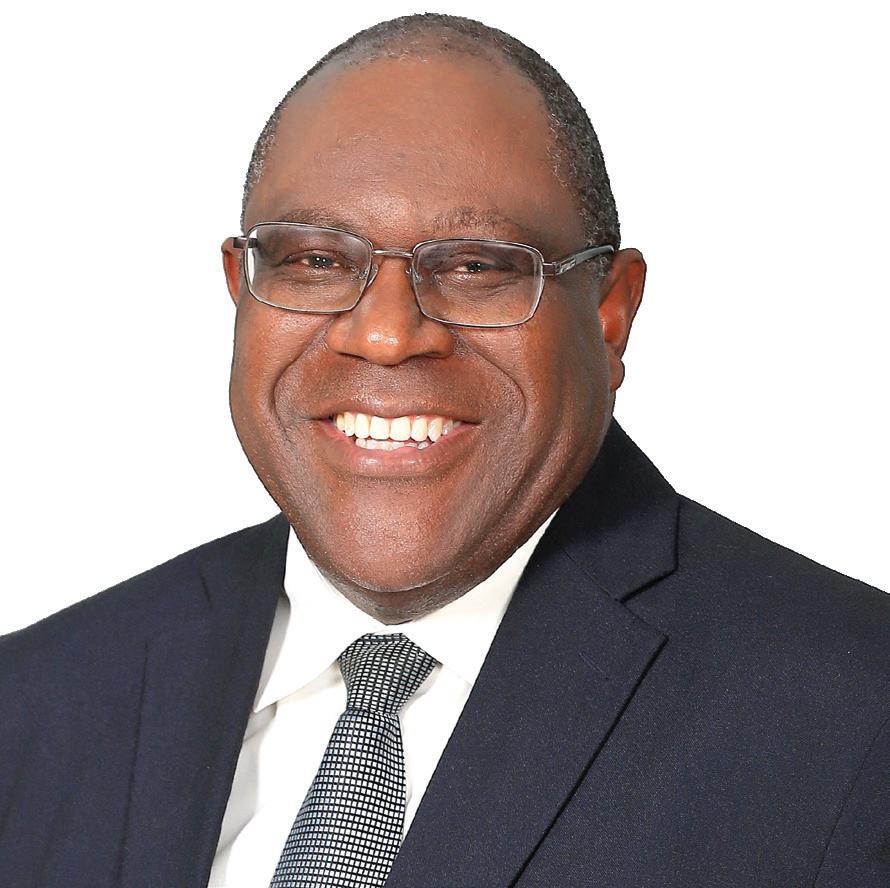


pandemic, which disproportionately affected young learners.
“Our biggest student population is actually 18 to 25,” Weems said. “We’re quite suspicious that those are a lot of the COVID years. That virtual option just was not great for so many people.”
The Excel Center provides life coaching, career navigation, and wraparound services to tackle non-academic barriers that often prevent adult learners from completing school. Support includes transportation assistance, bus passes, gas cards, childcare referrals, and connections to housing resources through community partners.
“It is a holistic view that is able to take someone from what they don’t have into that next level and beyond,” Weems said.
The program emphasizes workforce readiness rather than academics alone. Students attend classes four days a week and can simultaneously earn industryrecognized certifications in partnership with Virginia Western Community College, and other organizations.
“Our ‘what’s next’ is not just obtaining a high school diploma or even obtaining a career certification,” Major said. “We want
to equip our students with the skills to get a job and to keep a job.”
Employability coaching is integrated into coursework to help students build skills such as time management, conflict resolution and professional communication. Local employers are also directly engaged.
“We are tracking and still support our students after graduation, after they get a job,” Major said. “The ultimate goal is that we really want our students to earn that sustainable wage for themselves and their families.”
Experiential learning is also built into the curriculum. Goodwill has secured paid internships and job shadowing opportunities to expose students to real-world industries. Carilion Clinic has committed 14 paid internships for Excel Center students, while Altec in Botetourt County recently hosted a job shadowing event focused on careers in manufacturing and truck assembly.
“Everyone thinks they want to be a doctor until they see blood,” Major said. “It’s really important that they go and experience those things through internships and externships, so they know that’s what they want to do.”
Most students enrolled in the inaugural class are from Northwest Roanoke or nearby neighborhoods.
“The vast majority of our students come from the northwest sector,” Major said. “As much as 80% of our students come from previous educational experiences in Roanoke City Schools.”
Goodwill leaders view the Excel Center as a long-term investment in both the community and workforce pipeline. Although federal American Rescue Plan Act (ARPA) funding helped launch Melrose Plaza, Goodwill’s broader vision extends beyond one project.
“We want to dream big with it and then start in our local community,” Boyd said. “You have to start small in order to grow something big. And that’s truly what we’re after when we set such an audacious vision.”
While Goodwill’s service area includes 35 counties and 14 cities, the focus for now is on stabilizing and expanding the Roanoke Excel Center before considering additional locations.
“The first thing we want to do is make sure we get this one off the ground successfully,” Boyd said. “There are other communities with the same type of demographic numbers that have need. The long-range plan is yes, to duplicate this across our area. But we want to make sure we get this one solid.”
Enrollment for the second cohort is underway. For many Roanoke-area adults, the program offers something that once seemed out of reach—a fresh start.
“You still see that high level of, ‘Thank God this is here,’” Major said. “They’re excited to come back.”



By Zachary A. Collier
Executive Summary:
Businesses exist within a competitive landscape. Your company has competitors, and either their operations are better than yours, or your operations are better than theirs.
In the first case (they’re better) your company will need to find ways to improve its operations to a level that outperforms your competitor. In the second case, your competitor is likely working on improving their operations so they can outperform yours. In either case, complacency is a losing strategy. Instead, businesses need to pursue continuous improvement.
The concept of continuous improvement is straightforward: improving business processes is a never-ending journey. The ideas associated with continuous improvement originated in Japanese manufacturing, where the term is “kaizen” is used. A key element of the approach is that improvements do not necessarily need to be large. Rather, small and incremental improvements to business processes over time accrue to significant overall improvements in quality, efficiency, and cost-effectiveness. Even seemingly simple things like keeping the workplace clean and organized can yield operational benefits.
It can be difficult at first to identify areas for improvement. But in complex business environments, there are plenty of things that can be improved. How can you make your operations more efficient? How can you streamline your logistics and build better relationships with your suppliers? Are there ways to design a better product, or offer better customer service? Continuous improvement benefits from everyone’s input across the organization, from front-line workers all the way to the C-suite. Additionally, important feedback can be gathered from external stakeholders like customers and suppliers.
Even if you know what areas within your organization need improvement, it isn’t always clear what actions you could take that would bring about an improvement. Sometimes process changes simply don’t work. Other times, changes to processes can result in improvements in one area but cause unintended consequences in another. In this way, continuous improvement is analogous to the scientific method – you develop a hypothesis and test it to determine whether the hypothesis is supported by the evidence. If the hypothesis is wrong and the proposed intervention doesn’t bring about an improvement, then you go back to the drawing board and try something else.
Zachary A. Collier is Assistant Professor of Management at Radford University.
Taking a continuous improvement mindset means that there is always room for improvement. This can sound daunting and discouraging. Of course, it is important to celebrate organizational wins when process improvements are achieved. But settling for “good enough” is dangerous, because if your competition is continuously improving, they will eventually outperform you – which isn’t very good at all.

I can tell you exactly how healthy a business is just by looking at its sales sheet. If you can’t make sales, your company can’t survive. That’s why seasoned business owners often say, “We’ll sell the job and then figure out how to do the work.” Selling comes first. You can’t earn the revenue to pay your accounting team, marketing team, management team, or installation crew without paying your sales team first to bring in the contracts.
If you’re good at sales, you can get a job anywhere.
In his book To Sell Is Human, Daniel Pink explains that everyone is in sales—teachers, politicians, preachers, counselors, as well as insurance agents, realtors, car salespeople, and door-to-door reps. Anyone trying to move others to action is selling. The good news? You don’t have to sacrifice your integrity to do it. It’s not a zero-sum game where one person wins and the other loses.
The best salespeople connect their clients with the product or service that truly serves them best. They alleviate concerns, build confidence, and make sure the client feels emotionally at peace with their decision. Sales isn’t about tricking someone, it’s about guiding them to a solution that genuinely improves their life.
If what you’re selling doesn’t create a “wow” experience, maybe it’s time to find something you can stand behind— or improve your current offering until it does.
In the end, you want your clients to feel great about the decision you helped them make. Unfortunately, in my own industry, too many bad actors push products that benefit the producer more than the client. That’s why it’s vital to work with a fiduciary—someone legally and ethically aligned with your best interests.
Whether you’re selling lemonade, cars, cattle futures, smartphones, or swimming pools—your business can’t survive without sales.
So ask yourself:
• Are your sales on target this quarter?
• Do you truly believe in your product or service?
• Are you building confidence in your customers?
Because when you believe in yourself and in what you’re selling… it sells itself.
Confidence is everything.


By Daniel Colston
Executive Summary:
I’ll just say it — your business can’t survive without sales.
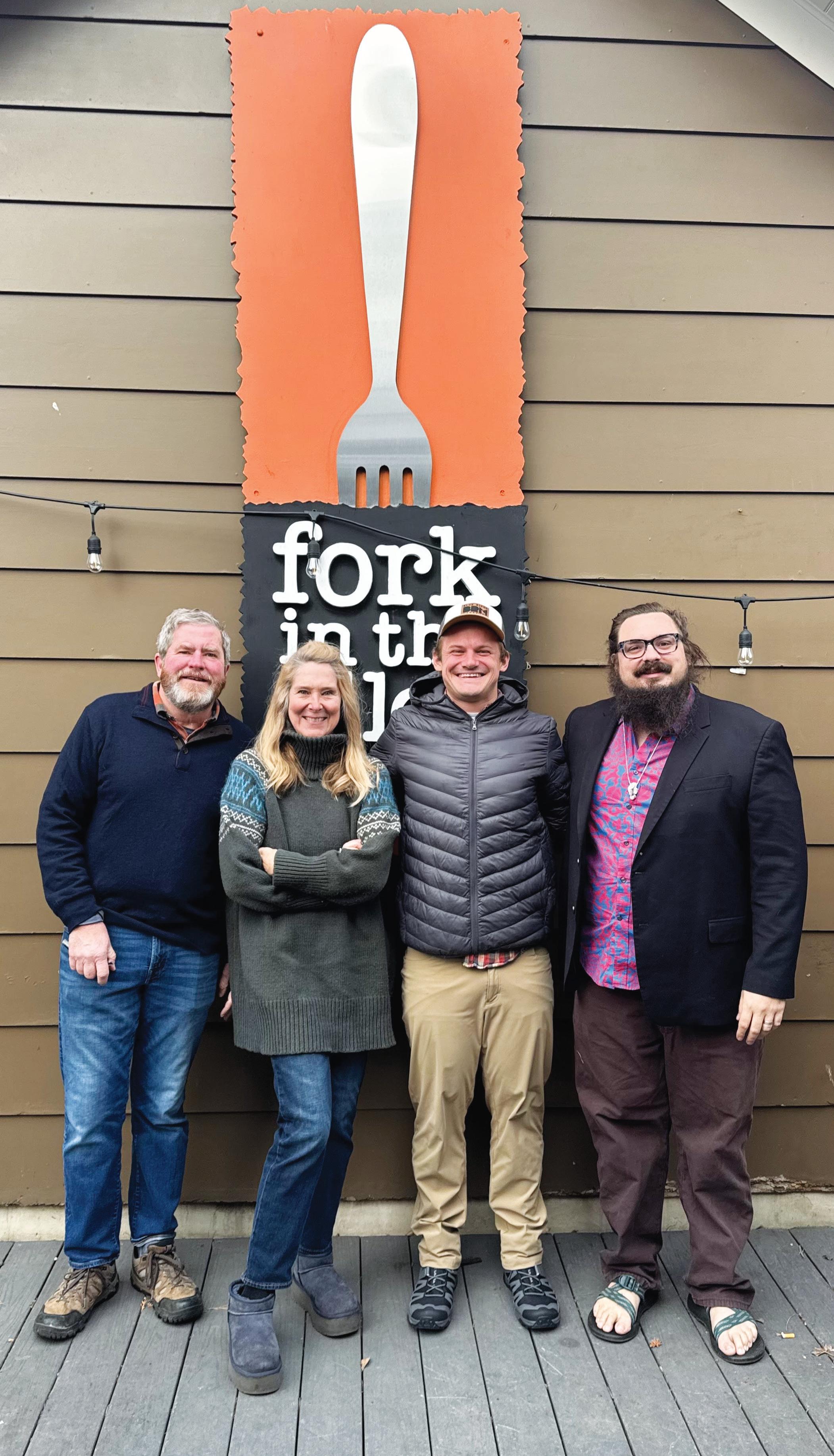
By Doug Doughty
When it first appeared that changes were in the offing at Fork In the Alley, there was plenty of concern over the future of a combination restaurant that was known for its live music on Friday, Saturday and Sunday nights. It was unfounded.
For a long time, it was run by Dr. David Trinkle (a former Roanoke City Council member) and his wife, Ann. After 20 years, they have turned the ownership over to childhood friend Andrew Ross, along with Nic Miller. Ross is co-founder of a group of beer bars in the Carolina. Both have local roots in the Roanoke Valley.
"Our first day of business was January 7th, "according to Miller. "Fork In the Alley has been here for 20 years and so we took over
or pretty much on the anniversary. I had a lot of restaurant experiences when I was in college and after college."
He is a graduate of the University of Mississippi, and while there worked under James Beard Award-winning Chef John Currence at City Grocery. I always loved restaurants; I loved working in one," he said during a recent interview. "I always kind of knew that, later on in life, I would like to own a restaurant. The opportunity to own

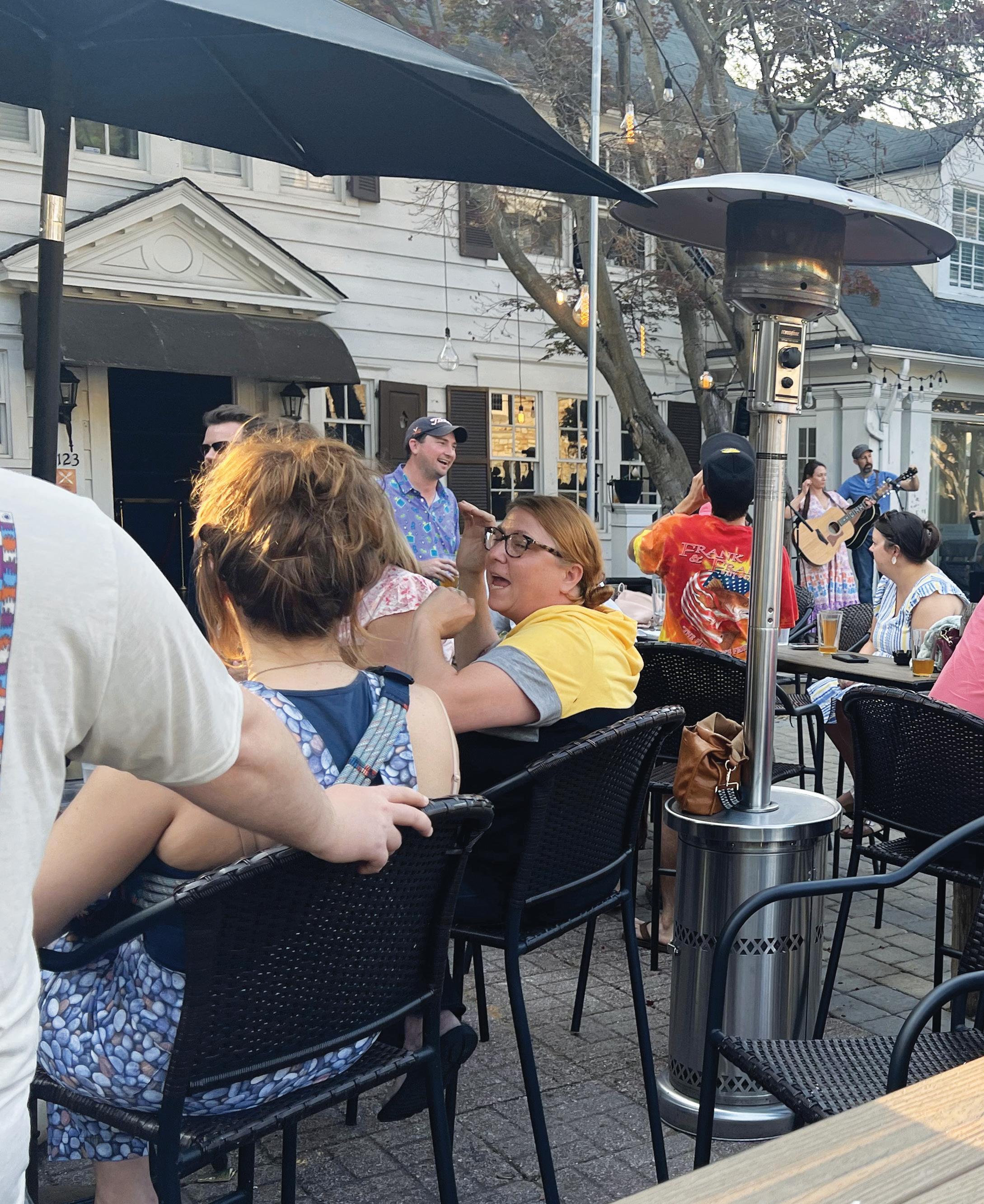
Fork In the Alley came about. It was about December [2024] that we found it might be for sake.
He was prepared: "when I was in college, I worked at a James Beard award-winning restaurant. I really saw how a successful restaurant is run when it comes to staff, food, drinks hospitality … all the important stuff. I always got in to it myself."
Miller, who taught English in several Asian countries for a spell, began his college career at Hampden-Sydney "and it wasn't really the college experience that I was
looking for, so I went to Ole Miss. which is the complete opposite. I loved it."
Now Miller and Ross are putting their own stamp on The Fork, a South Roanoke neighborhood favorite. “It's all fresh food now. We started with a small menu, and then in September, we expanded our menu.
“Thursday through Sunday are live music nights. We're doing as many events as possible."
How about another Fork In the Alley? "Before that ever would happen, we

would rather consider re-branding this one -- changing the name, changing the brand," Miller said "and really making it something more of our own."
Trinkle, the former owner, still has Fork in the Market in down town Roanoke, but they're no longer associated with Fork in the Alley. After a fire shut down the Market location for a bit, Fork In the Alley took some of the bartenders to come to the Fork "and we gave them shifts here to help them make some money and stay afloat," Miller said. "Even though we're not associated with Fork In the Market, we still kind of consider their
employees as our families because we really know them well."
Virginia and Virginia Tech football fans stop by at the Fork when games are on. “Sports are always on the TVs here. We're focusing a lot on music, too - we want to be known as a music venue.”
Fork in the Alley is a true neighborhood bar & grill. "If nobody's here on a Sunday night and it's not football season, we might close closer to 10, notes Miller, “during football season, we're open as long as people are here."


By Jamie Wigand, Senior Consultant at Building Beloved Communities
Executive Summary: Every organization knows its people are its greatest asset, but in today’s climate, keeping teams strong takes creativity.
With funding shifts, staffing shortages, and rising competition for talent, leaders are being pushed to rethink what it means to build a resilient workforce. The challenge isn’t just filling positions - it’s finding sustainable ways to bring in the right skills, at the right time, without exhausting budgets or burning out staff.
A flexible path forward is emerging: more organizations are meeting these challenges by turning to fractional and contract talent. Rather than committing to a full-time hire, leaders can bring in experienced professionals on a parttime or project basis, adding capacity right where it’s needed, without long-term strain.
Fractional work is essentially “shared expertise”: specialists who partner with multiple organizations, offering skills that might otherwise be out of reach. For nonprofits and small businesses, it’s a way to stay nimble and competitive while budgets remain tight. Think of it as renting expertise instead of buying it outright, a model gaining momentum because it keeps organizations agile while reducing risk.
The advantages are clear:
• Lower Overhead: Pay only for the work you need, when you need it—no benefits packages or long-term commitments.
• Agility: Expand quickly for a project or transition; scale back just as easily when resources shift.
• Independent Support: Contractors often work with minimal oversight, freeing staff to focus on priorities.
• Reduced Risk: Flexible arrangements help organizations avoid layoffs or hiring freezes during turbulence.
• Expertise on Demand: Gain access to top-level skills in finance, HR, IT, or strategy that a full-time hire might never fit in the budget.
Turning to contractors doesn’t mean sidelining employees. People remain the heart of every mission-driven organization. Both staff and contractors thrive when they feel respected, supported, and included. That means:
• Fair and transparent pay and benefits for employees whenever possible.
• Opportunities for development that grow skills, confidence, and pathways to leadership.
• Clear communication and policies that honor contributions, whether from long-term staff or short-term specialists.
Often, the best approach is a blended one: relying on contractors for specialized or time-bound needs while continuing to invest in your core team and culture. This enables organizations to meet immediate challenges without compromising long-term stability.
Ultimately, investing in people - whether employees or contractors - remains the most effective way to strengthen an organization. Leaders who pair the efficiency of fractional work with the humanity of a supportive culture build not just quick solutions, but lasting resilience.
When organizations plan thoughtfully, communicate clearly, and care for their people, they weather uncertainty with more creativity and less fear. In a hiring landscape that feels unpredictable, that balance of flexibility and people-first culture may be the most valuable asset of all.



Small Batch Liquidation is a warehouse in Roanoke with overstock, closeout, discontinued, and returned inventory

from big retail companies and brands you know. It’s at 315 Albemarle Ave, SE—and online at smallbatchliquidations. com. Pitchman Joe Connor is all over social media, showing the latest arrivals as he gets deal-seekers jacked and excited about new-but discounted-products they can score.
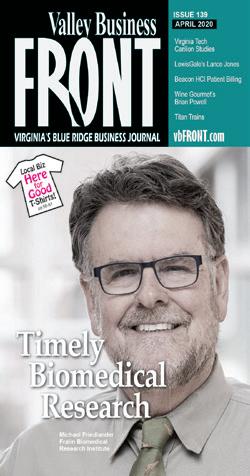






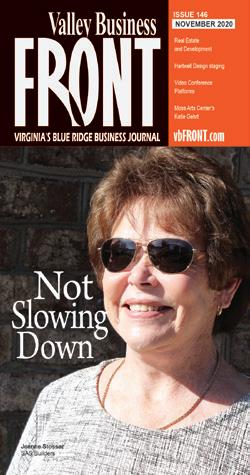
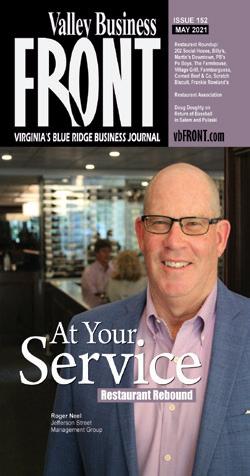
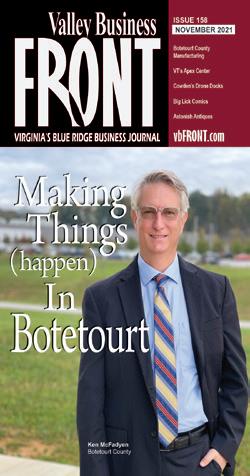



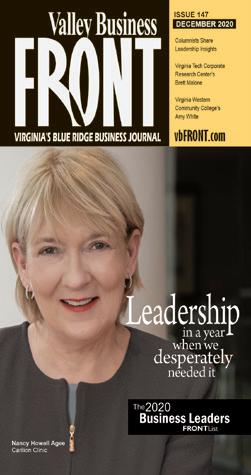


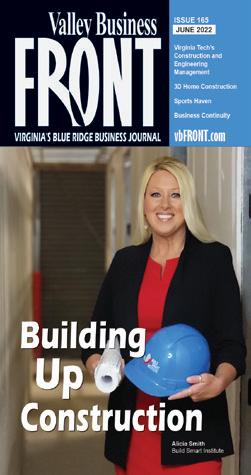



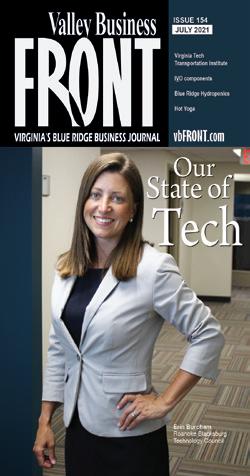
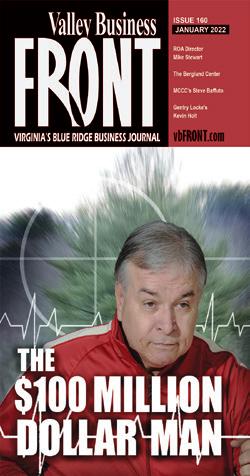





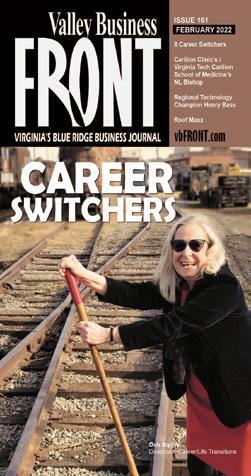


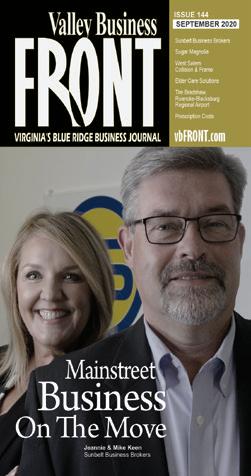


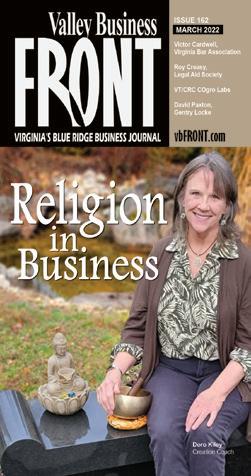








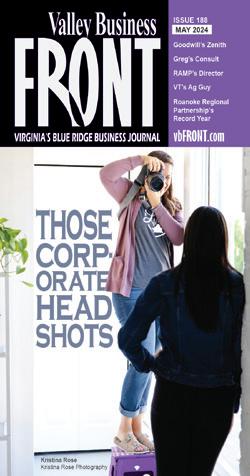
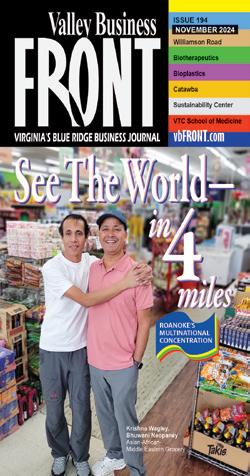




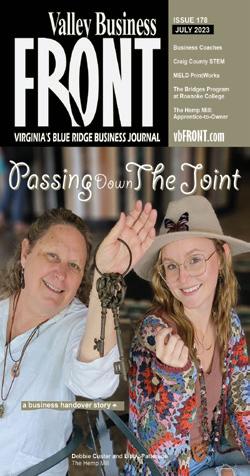
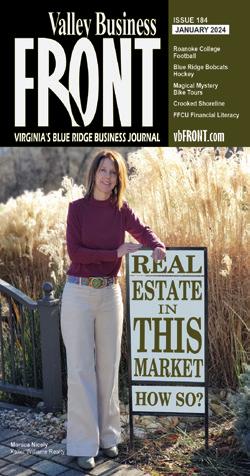

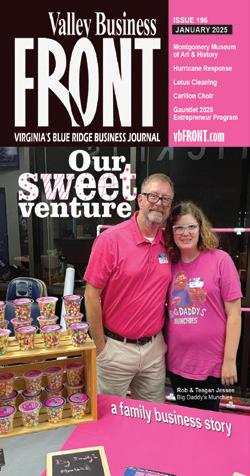
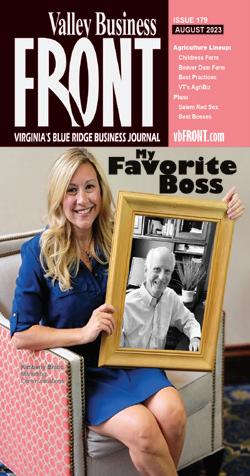
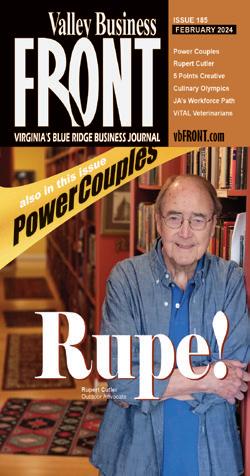


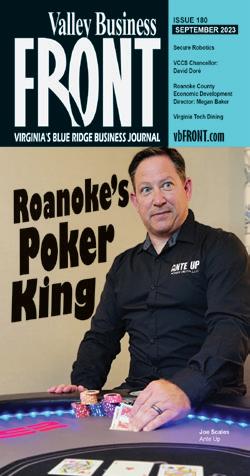



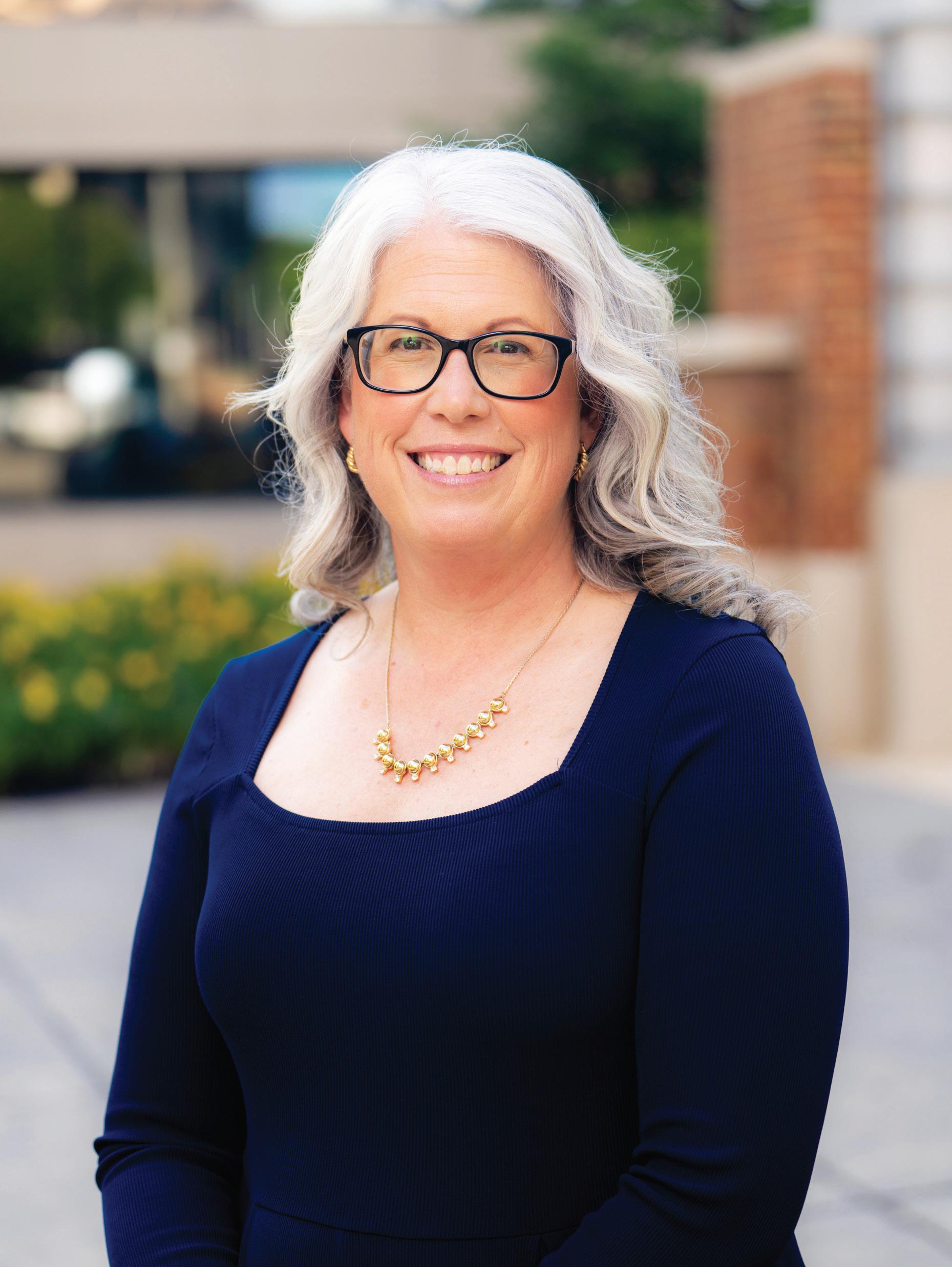
By Jennifer Poff Cooper
“Love the job you’re doing” is the career philosophy of Carly
new President and CEO of the Community Foundation Serving Western Virginia. And she does.
Carly Oliver has been with the organization for 20 years and asserts that there is “never a bad day” because “every day we get to help.” Since its founding in 1988, the Community Foundation Serving Western Virginia has invested nearly $75 million in grants for nonprofits and scholarships for students across the region. It has over 400 endowment funds, and “everyone is different,” said Oliver, depending on the donor’s intent.
A transplant to the area with education and background in business administration (bachelor’s from North Greenville University in South Carolina and a master’s from Averett University), Oliver joined the Foundation in 2005 as Assistant Director of Programs and Donor Services, became Associate Director in 2007, and since a 2018 restructuring, has served as Chief Operating Officer. In March of this year, founding President Alan Ronk retired and Oliver was promoted to President and CEO.
No matter what the title, Oliver says she’s always been a jack of all trades. “At the Foundation, you wear a bunch of hats and jump in where needed,” she said. “I still have a hand in everything.” The Community Foundation Serving Western Virginia covers southwest Virginia, the Roanoke Valley, and Martinsville/Henry and Patrick Counties. As for how the Foundation addresses the needs of these diverse communities, Oliver said: “It comes back to donors who want to help a particular area, what they want to make possible.”
The Foundation’s largest bequest ever allowed for a $395,000 grant dedicated to visually impaired students in Roanoke City Public Schools. “It completely changed the way visually impaired students are taught,” Oliver said. Unrestricted funds (not grants mandated for specific projects) are also useful, as they allow the Foundation to determine needs and direct funds to those places. “We love unrestricted funds,” said Oliver. “Communities change all the time, and these funds allow us to pivot and meet new needs.”
Because it relies solely on private donations, the Foundation hasn’t been affected by recent federal funding cuts. However, Oliver said that more nonprofits are reaching out
Community foundations have been around for more than 100 years, with the first being established in Cleveland in 1914. They began as public charities, creating a new model of philanthropy beyond private family foundations. Unlike nonprofits with a single focus—such as the arts, healthcare, or disaster relief—a community foundation exists to strengthen the overall well-being of its region. It does this by helping donors establish permanent endowment funds to meet local needs.
Community foundations are 501(c)3 non-profits. Oliver emphasized that there is no umbrella organization, and each community foundation is its own entity. “We operate similarly but each serve our own community,” she said. Oliver loves that the environment is not competitive. “All community foundations want to help each other,” she said. “There is no re-inventing of the wheel.”
Today, there are more than 1,000 community foundations in the U.S., managing over $112 billion in assets. Collectively, they distribute more than $12 billion each year. “Community foundations are really great philanthropic vehicles that allow donors to carry out their charitable intentions,” Oliver said. “We are the best vehicle to do that, and we do it in perpetuity.”
to ask the Foundation for assistance with programming. In fact, because of federal funding reductions, there is a new grant opportunity – general operating support grants – to specifically address the “significant impact of cuts on nonprofits’ ability to provide services.”
Contributing to the growth and longevity of the organization, said Oliver, are the Foundation’s tenured staff, its reputation for working well with donors, and its good relationships with professional advisors in the community.
Amongst the long-time staff, there is great knowledge as well as shared passion. “I don’t make the Community Foundation run,” said Oliver. “It takes all of us.” Professional advisors such as attorneys, CPAs, and
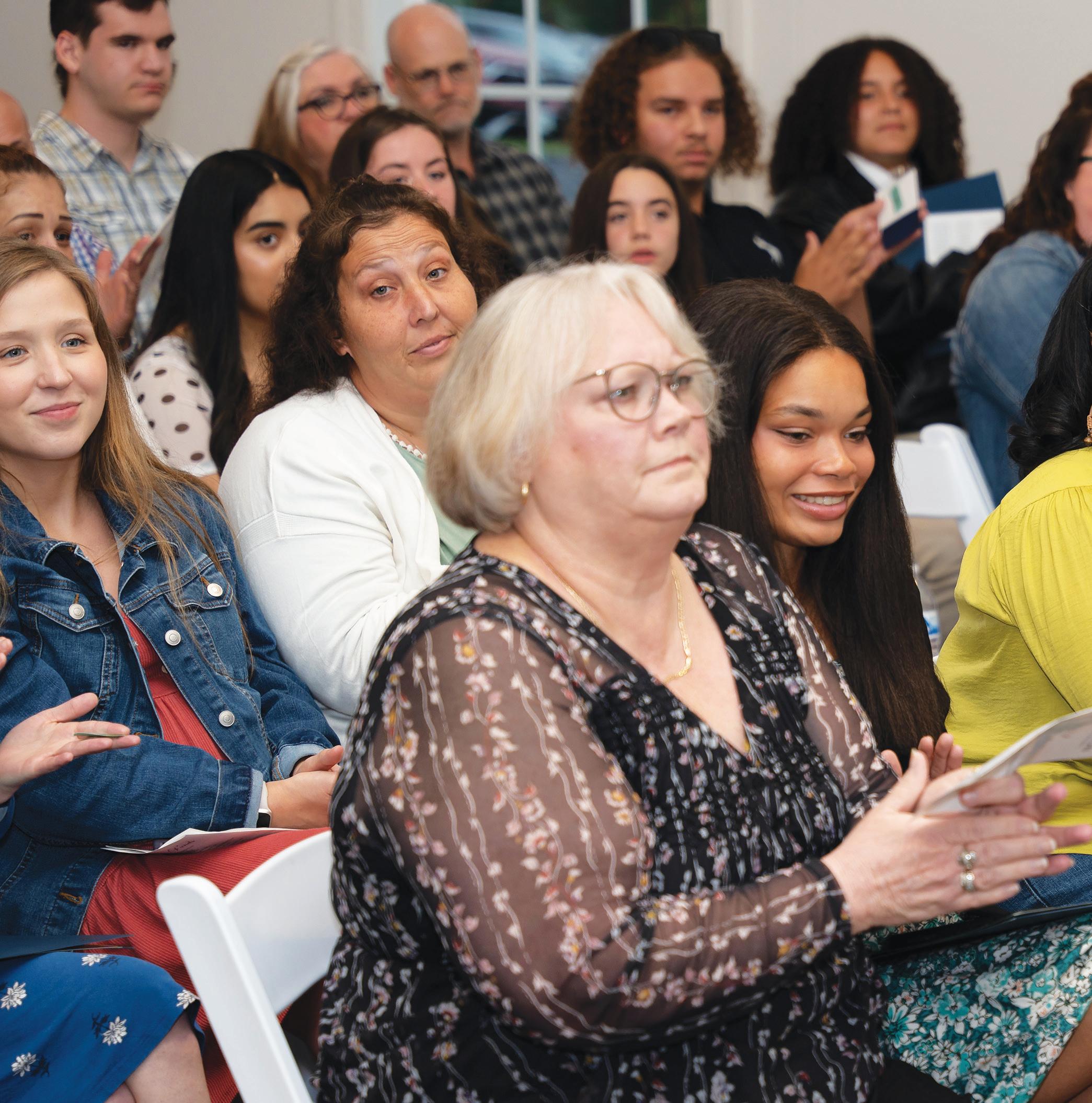
financial planners help inform their clients’ philanthropic decisions, so the Foundation ensures they understand what the organization is doing. “Word of mouth is how the Foundation gets in front of folks,” said Oliver. “We are wellrespected, and the community trusts us,” She attributes these strengths to the hard work Ronk put in during the early years: “Alan created such a great legacy.”
One Foundation initiative that generated awareness and funds was Roanoke Valley Gives, a 24-hour day of online giving involving over 100 nonprofits. Started in the mid-2010s, it was a “program that helped get our name out in front of the community,” Oliver said, and raised $4 million over its five years.
Oliver worked so closely with Ronk that her transition into her new role was easy. Still, she feels she has “big shoes to fill.”
Ronk did remind her that “we are each our own person,” and Oliver’s individual strengths are serving her well.
Focusing on efficiency, she has always endeavored to figure out how to “get work done quicker and improve processes.” She is also creative, citing Roanoke Valley Gives as her brainchild. As a self-described visionary, Oliver has dreams and goals for the Foundation:
• Add staffing to increase the Foundation’s philanthropy footprint and “make new ideas happen”
• Look at ways to improve technology, like allowing donors online access
• Build relationships with younger professional advisors
• Substantially increase marketing efforts.
In the future, Oliver said optimistically, “the sky is the limit.”



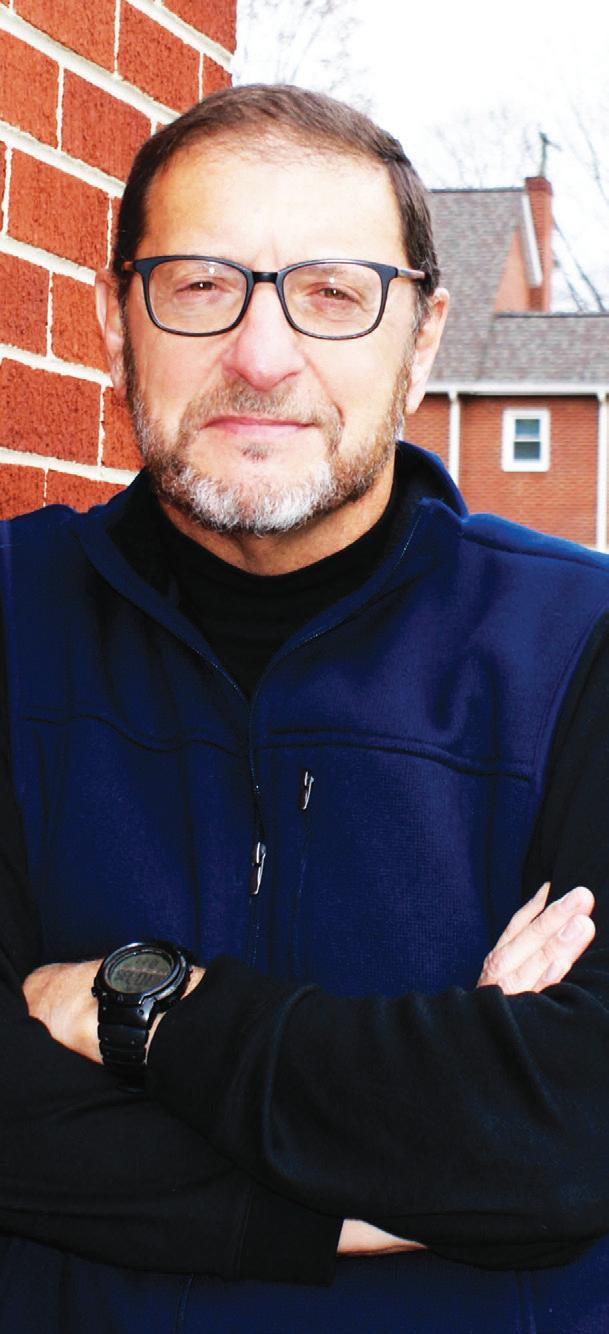
THERE’S SOMETHING HAPPENING HERE
By Gene Marrano
Executive Summary: Look to the box as a sign that things are slowing down economy wise?
Cardboard … as an indicator of a
With mixed signals surrounding the U.S. economy, one Virginia Tech economist is rethinking how we spot a recession – by focusing not outside the box, but on the box itself.
Economists use many tools to spot signs of recession or inflation, and Dr. Jadrian Wooten, an economics professor at Virginia Tech, is looking at an unusual one: cardboard boxes. Wooten says the cardboard box index, which tracks production and shipments as a proxy for manufacturing and consumer demands, can serve as an early warning sign for a recession.
Wooten adds that retailers like Walmart and Target typically need to have products ready at the beginning of November for the holiday season. “All of their suppliers [had to] ship things out in October, but they needed to order their boxes back in September. Because there’s likely to be a slowdown in holiday spending stores like Target and Walmart are not ordering as much stuff, [which means they are not ordering as much as much [from cardboard box suppliers].”
Wooten says there’s no perfect way to predict a recession; however, having an idea of where the economy may be headed can help with preparedness. He says recent funding cuts have forced U.S. box makers to scale back operations, threating thousands of jobs in a trend reminiscent of the 2008 recession. Wooten adds that tracking the capacity and output of cardboard boxes remains an important signal in today’s economy.
“It’s been a rough couple of years for a lot of Americans from top to bottom, we’ve dealt with inflation, tariffs, it’s been a rocky couple of years,” Wooten notes. “I think people [and maybe the Fed bank?] are looking for some sort of signal on what the future holds. This unfortunately [slumping cardboard box orders] is one of those signals that says something not good is happening – even though a lot of us are looking for some optimism.” With aspects of the economy like unemployment and inflation fluctuating, Wooten says recession indicators are aligning in a way that could signal trouble ahead.

“”
I think people are looking for some sort of signal on what the future holds.
You are familiar with our FRONTperspectives, right? These are columns we publish each month that address relevant topics in business sectors written by experts and stakeholders connected to those sectors.
Do you know we’ve presented 14 primary sectors in our 206 editions of FRONT to date? These include: Business Operations, Marketing, Finance, Wellness, Legal, Small Business/Entrepreneurialism, Technology/Innovation, Professional Development/Education/HR, Real Estate/ Development, Sales/Networking, Etiquette, Style/ Fashion, Nonprofit/Community Service, and Demographics (i.e. “Young Professionals”).
Within these 14 primary sector FRONTperspectives, we’ve presented 29 branded columns written by over 50 contributors.
Would you or your organization like to sponsor one in your industry (or an industry connected to your business)?
Some sponsorship openings are available in our current lineup.
And we’re open to 2026 sponsorships in FRONTperspectives we don’t currently publish.
An easy campaign idea is for your organization to place a FRONTfooter ad or quarter-page ad with a relevant FRONTperspective column. (Like an Acme Widgets ad with “The Wild World of Widgets” by Figgit Tootson, industry insider.)
We’ll watch out for conflicts of course (we don’t want Fairfield Bank continuously sponsoring “Money Matters” by Anytown Bank CEO Penny Penchum); and you’ll have to keep in mind our columns are independent and include opinions and advice.
But here’s the best part: You essentially own a page (or two) or real estate dealing with your industry—with only a partial page paid ad. In some cases, that’s as much as a $3,000 value over your investment—per edition of FRONT.
Whattaya say?
And if your name is something akin to Cuffy Blackwell, heck, we could bring our Fashion column back.


By Tom Field
Executive Summary: You can leverage a FRONTperspective with your business development in FRONT.
Readers and patrons of the business journal are invited to submit reviews (along with an optional photo) to news@vbFRONT.com. We’ve expanded our reviews to include books, music, art, performances, culinary—with a preference for local productions. Reviews must be original, include the author’s name and location, and should be brief, under 350 words.
Ouch. It’s called The Bee Sting (Picador; 2023), how else did you think I’d begin? It’s a stinger of a read, for sure. Family drama and introspection at its finest. Man, does Paul Murray go deep with his dysfunctional Barnes family in contemporary Ireland. Life turns, decisions, and directions all gone wrong—this story is messier and more complex than a beehive attached to a Jenga tower. Okay, I won’t drone on with the extended buzzy metaphor. Let’s just say this sullied drama is too sticky to put down. (Dang it, now you’re thinking honey, right?) Excellent writing. The only frustration is the final page, when everything you’ve been fed leads up to the most sensational conclusion that’s been pollinating for 643 pages. If resolution is what you expect, forget about it. And you know it’s not a cliffhanger that you’ll ever be able to come back to. Still, it’s a remarkably told story to hive and to hold.
—Tom Field
The Wheels on the Bus (2025; independent) is a book project in collaboration with Roanoke Arts Commission, Valley Metro, Ride Solutions, and the Bus Riders of Roanoke Advocacy Group —illustrated and written by Joe Lee. The 34-page cartoon style publication is available for reading online via a link from the Roanoke Valley-Alleghany Regional Commission (or at heyzine.com/ flip-book/5777592d86.html). The book invites you to engage public transit and how it welcomes all. If you’re a Star City native

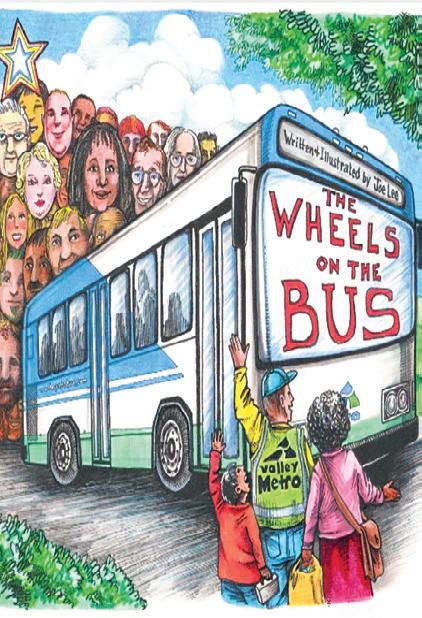
or resident, you’ll instantly recognize the “sights” along your ride, which include the popular landmarks, history, and icons of our beloved City of Roanoke.
—Tom Field
The Roanoke Symphony Orchestra, following its annual free concert at Elmwood Park in September that drew a record crowd estimated at 4500 according to music director and conductor David Stewart Wiley, kicked off the 2025-26 season in earnest with a concert from its Pops series at the Salem Civic Center. Fronted by the long-time touring group Boogie Wonder Band, with disco era hits from the 1970’a (Donna Summer, Kool and the Gang, Bee Gees, Abba, etc.) delighting the audience, many of whom were of a certain age and remember those days of leisure suits and dancing shoes. Lots of fun. Wiley notes that disco tunes were often “sweetened” with strings and horns, making it easier in some ways for the RSO to accompany the Boogie Wonder Band (a play on Earth, Wind and Fire’s Boogie Wonder Land, which yes, was performed) than some of the other styles of music they play during the Ops series.
October also saw the 2025-25 debut for Roanoque Baroque, featuring the smaller classical ensembles prevalent in that era, with guest violinists and a guest soloist. Members of the group also played instruments designed to mimic those from the Baroque era, during a concert featuring Vivaldi string compositions, all under the baton of artistic

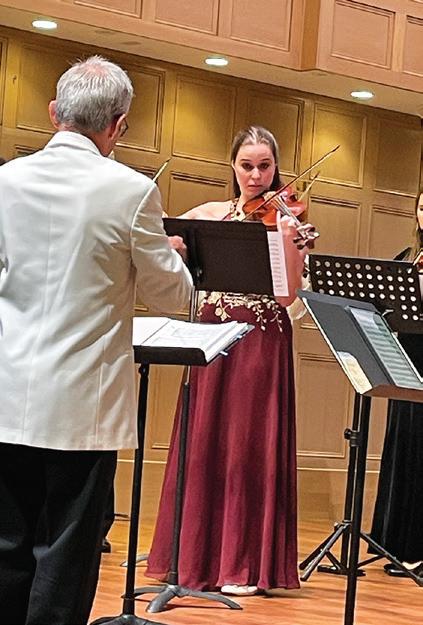

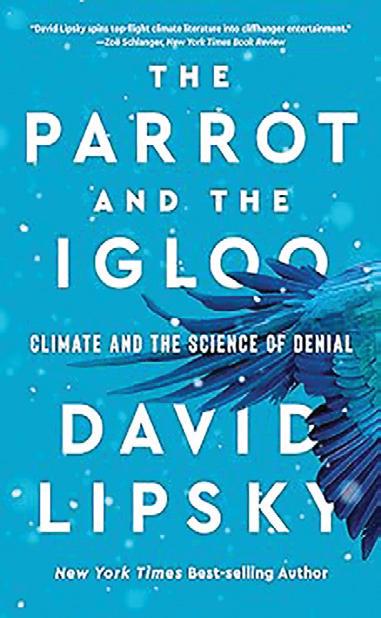
director Michael Shasberger. A musical treat for those that enjoy the virtuosity of classical musicians.
—Gene Marrano
The great irony about Loserthink (Penguin; 2019) by the cartoonist Scott Adams of ‘Dilbert’ strip fame, is that the people who could benefit most from reading it are likely the same people who would never read it. Of course, I’m projecting my own biases in saying that. Oh, well. For as many years as I can remember, I have absorbed myself in the collective arts of rhetoric and forensics (the debating varietal) and logic and reason and rational thinking. Now I know, we ALL think we’re smart and reasonable—but I swear sometimes I must be using the same lenses as Adams with the ideas and utterances that hit me every day—particularly political posts on social media. I don’t know what is revealed more… gullibility or hypocrisy or outright indoctrination. I promise I don’t think I’m special, but am I the only one who sees this? My best friends from all persuasions often share the wackiest propaganda, just accepting compatriot notions as if it’s all equally valid and legitimate. “Clear thinking is somewhat rare,” Adams says, understating. “If you buy into the full-scary narratives promoted by either the political left of the political right, you’re probably experiencing loserthink. A more useful way to think of the political news is that nearly every major story is exaggerated to the point of falsehood, with the intention of scaring the public.” Adams says the business model of today’s
media is so tied to audience reaction, it influences the content more than ever. Published in 2019, it’s surprising how well this book still holds up.
—Tom Field
Think the worry over – and the debate about – climate change due to manmade conditions is new? It was a topic of discussion in the 1800’s; and well before that even experiments showed that carbon released into the atmosphere could trap carbon dioxide that if not released would warm the planet. A 1956 New York Times article prophesized that once global warning kicked in, we might see parrots in the Antarctic. Obviously, that hasn’t happened (yet?) but in The Parrot and the Igloo: Climate and the Science of Denial (W.W. Norton, 2023).
Author David Lipsky, who writes for the Times and other publications, explores how “anti-science” has become so prevalent and often political these days. To his credit Lipsky approaches what is difficult subject for some as a tragi-comedy, with humor and a light touch. Read his book and make up your own mind, in this episodic page turner that spans more than a century on a topic many are still debating.
—Gene Marrano
The reviewers: Tom Field is a creative director, writer, and publisher; Gene Marrano is a news reporter and FRONT editor.

The Public Relations Society—Blue Ridge Chapter (PRSA-BR) hosted a panel of news media professionals on the topic of the changing landscape at Zeppoli’s restaurant in Blacksburg on Oct. 9. Panelists spoke about audience habits, shifting platforms, technology and the like and included Jeff Schwaner (Cardinal News digital); Brent BonFleur (WDBJ television, now in Hartford, CT); Michaela Scott (Virginia Tech Collegiate Times, who said the print version will disappear next year); and Gene Marrano (WFIR radio and Valley Business FRONT).


What’s the most popular food vendor at Radford Highlander Festival? Well, it probably should be The Scottish Cottage. And—it was! Fortunately, the line moved quickly for folks at the popular annual festival celebrating all things Scots-Irish and Celtic on ye bright sunny da’ on Oct. 11. In addition to the haggis, shepherd’s pie and sticky toffee and the family clan booths and various merchants and organizations on the Radford University campus, popular draws included the Highland games, of course, sheepherding demonstrations, and music especially the “rock bagpipe” performance (yes, there WAS such a thing) by Ally the Piper (who played her crowd-rousing rendition of Enter the Sandman, along with many other tunes on the footstomping playlist).


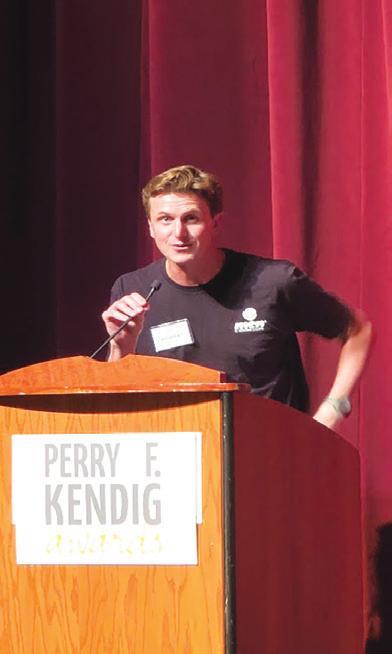
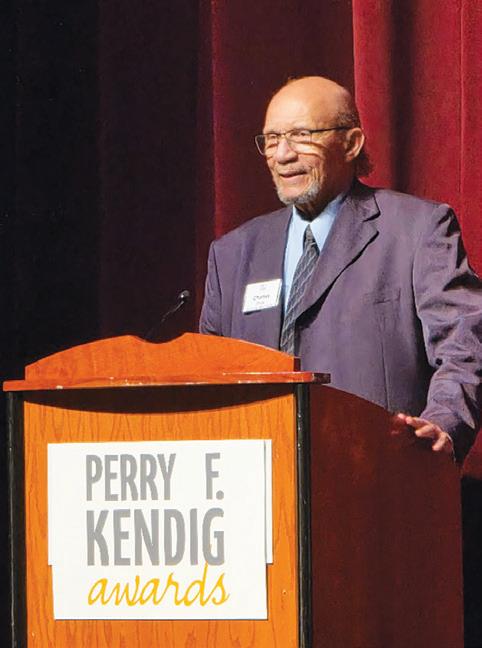


The 2025 Perry F. Kendig Awards for arts and culture celebrated its 40th anniversary along with the annual ceremony at Roanoke College on Oct. 14. Shown above are all the nominees on stage; the Hollins University Choir performing at the conclusion; and the three main winners: Jonathan Murrill (muralist for Individual Artist); Charles Price (for Individual Arts Supporter); and the Roanoke Cultural Endowment (with Nancy Gray, Shaleen Powell, Sherman Lea, Jr for Culture Organization). Also, Joanne Leonhardt Cassullo accepted the Horizon Award (flanked by Kendig sponsors Roanoke College’s Frank Shushok and Hollins University’s Kerry Edmonds).

Georgia Jipp: Blizzard Pilot, the debut nonfiction children’s book by Laura Beth Dean, a Registered Nurse at Warm Hearth Village, has earned national recognition for its powerful storytelling and historical significance. Illustrated by Jeanne Bowman, the book chronicles the heroic efforts of Georgia Jipp, a pioneering pilot who flew more than 150 life-saving mercy missions for the American Red Cross during the historic South Dakota blizzard of 1949. Dean, who spent two years at Warm Hearth at Home in Home Health and Home Care works in Quality Assurance and Staff Education at Warm Hearth, has translated her passion for service and storytelling into a picture book that is resonating with readers. The book has received several prestigious honors, particularly in the Western and nonfiction literary communities, including the 2025 Spur Award Best Western Children’s Picture Book Presented by the Western Writers of America. (Dean pictured with Spur Award.)

The Virginia Tech Board of Visitors has approved a budget plan that is says, “positions the university to compete with top athletic programs in the Atlantic Coast Conference.” The additional $229 million planned investment in athletics over four years, which includes both internal and external sources, provides bridge funding to reach a sustainable financial position by the 2029 fiscal year. “Virginia Tech is at a historic juncture in the history of Hokie Athletics,” Virginia Tech President Tim Sands said during the meeting. The national debut of capped student-athlete revenue sharing and name, image and likeness licensing regulation, and the ACC’s media revenue distribution tied directly to viewership and success for the first time, gives Virginia Tech an opportunity to reset the organization to align with the new realities at the national and ACC levels, according to Sands.

The 2025 Art By Bus Celebration was held last month in downtown Roanoke and included remarks by this year's "Writer By Bus," in which a local author rode Valley Metro buses earlier this year, and then journaled about it. Author and illustrator Joe Lee turned that experience into The Wheels on the Bus, a comic book style work: “I love adding stories to pictures, which is what a cartoonist does. I really wanted to say as much about the experience of riding the bus and the history of bus riding and transportation in Roanoke.” Lee's illustrations for his book also became a wrap that is now decorating a Valley Metro bus. His book will be available at various venues around Roanoke. Valley Metro has reported increased ridership numbers in recent years. NOTE: See our FRONTReviews section for a review.
A high school senior who helped build Roanoke County’s new LOVE sign says the experience is shaping his future. Tyler Curfiss is a third-year welding student at the Burton Center for Arts & Technology and a senior at Glenvar High School. He’s currently interning with Lift Arc Studios — the local custom metal fabrication shop in downtown Roanoke run by Tay Whiteside that designed and built the new sculpture. Roanoke County unveiled the new LOVE sign outside its administration building recently as part of the Virginia Tourism Corporation's “Virginia is for Lovers” campaign. The sign will travel to events around Roanoke County until it eventually settles down for good at Explore Park.
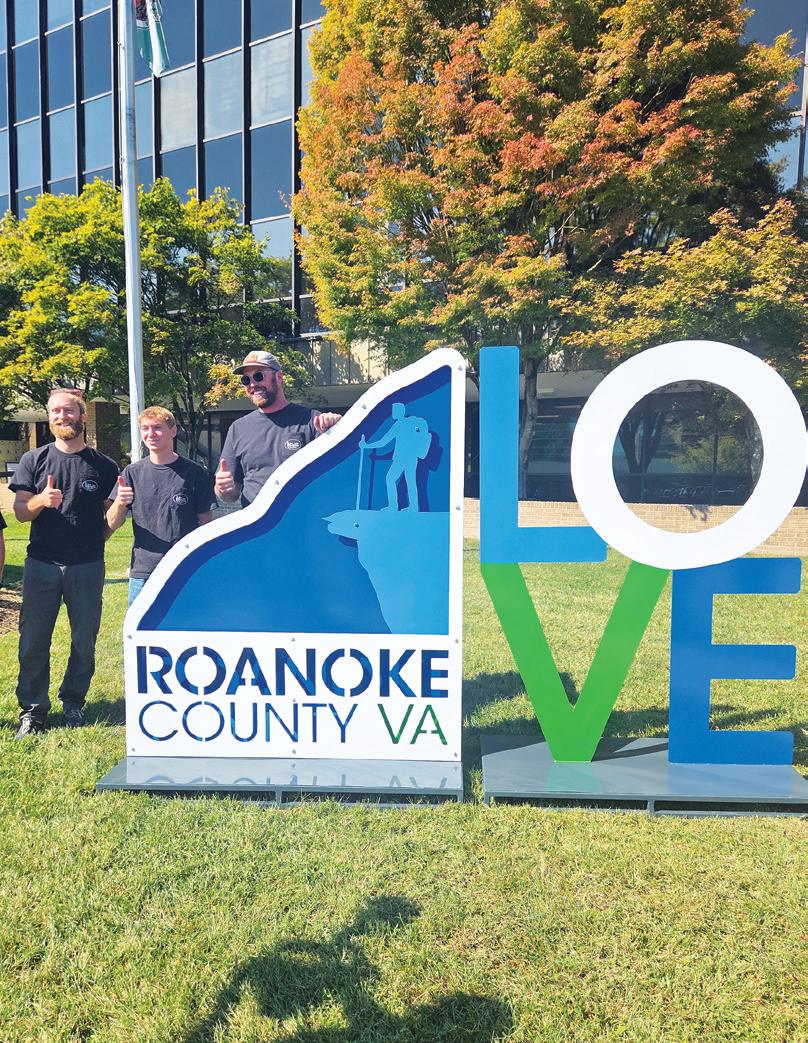



For nine years and counting The Spot on Kirk has provided an intimate stage for local, regional and national touring performers - even Grammy nominees. What was once Kirk Avenue Music Hall and then briefly a downtown Co-Lab satellite lounge is now the non-profit Spot on Kirk. Founder and Board President Bruce C. Bryan (also the founder of 5Points Creative) says last month’s Bourbon, Bubbly & Brew fundraiser was a key component in helping to keep the doors open at the Kirk Avenue venue in downtown Roanoke: “what people don’t understand is that … really looking at any arts organization in all likelihood … you can’t make enough in ticket sales to cover your expenses.”
The music at The Spot on Kirk is typically eclectic, with local and regional performers and a generous helping of musicians that have made a name for themselves elsewhere, or have toured with big name acts. Not to mention the standup comics who grace the stage there on a frequent basis. Bourbon, Bubbly & Brew featured local food and libation stations that included Brady’s Distillery, Sidecar, Show Pony, Hamm’s Fine Foods, Well Hung, and Six & Sky. Singer-songwriter Jordan Harman entertained in The Eye Planetarium at the Science Museum of Western Virginia, which served as the venue.




“GoFest”—as the Roanoke GO Outside Festival is commonly called—happened in downtown Roanoke, October 18—19. The perfect weather probably helped draw super large crowds, who experienced everything “outdoor recreation-related” from bike-paddle-hike-climb activities to vendors and exhibitions.

The Virginia General Assembly has honored Dr Pepper Park at the Bridges in Roanoke with House Joint Resolution 605, commending Dr Pepper Park on its 10th anniversary and “recognizing its contributions to Roanoke’s cultural life and community vitality.” The resolution highlights a decade of artistic impact, of honoring local legacy — Dr Pepper Park’s name pays homage to the Commonwealth’s ties to the Dr Pepper soft drink; the community connection — the resolution notes Roanoke’s history of Dr. Pepper bottling (including the first bottling plant in the Commonwealth) and the venue’s partnerships with local businesses and organizations.


Roanoke County Public Schools is looking to attract big industry and other layers of all sizes via a fundraising initiative. During a ceremony in late September which saw the final beam signed by those involved and then put in place for the future Career and Technology Education Center just off Peters Creek Road, members of the Roanoke County School District officially launched a brand-new “Campaign for Excellence,” a fundraising initiative mean to give students the resources they need to be successful in their future careers. Career & Technical Education Director Jason Suhr says the district is done with quiet phase of the fundraising and is now ready to take the next step. “We’re looking for everyone to be involved, not just ‘big fish,’ big industry yes, we want their involvement; we want medium industry, we want small business, we want community members – local stakeholders of all types involved with the campaign.” The new CTE Center will replace the current Burton Center for Arts & Technology in Salem, which is outdated and too small for an expanding curriculum designed to help more high school students become job-ready, or at least expose them to careers they might want to pursue at some point.
Valley Business FRONT is FRONT’n About at many events each month. Check the social media links at www.vbFRONT.com for more coverage.
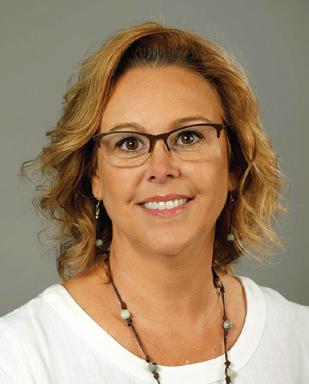
Susan Nolley has been appointed Dean of Health Professionals at Virginia Western Community College. She was selected through a competitive national process. Nolley has nine years of experience as the Program Head for Radiography, CT, and MRI and served at VWCC since 2007.

Lance Collins, the founding executive director and vice president who led
Virginia Tech’s Innovation Campus initiative in Alexandria, has been named vice president of the greater Washington, D.C., area. In this expanded role, Collins will serve as the senior university official responsible for leading Virginia Tech’s growing presence in the greater D.C. area.

Miguel Perez has been appointed head of the Department of Biomedical Engineering and Mechanics at Virginia Tech. An associate professor in the department, he currently serves as its associate head for research and graduate studies.
Beatrix Manning is the new chief medical officer and a radiation oncologist at the Virginia Tech Animal Cancer
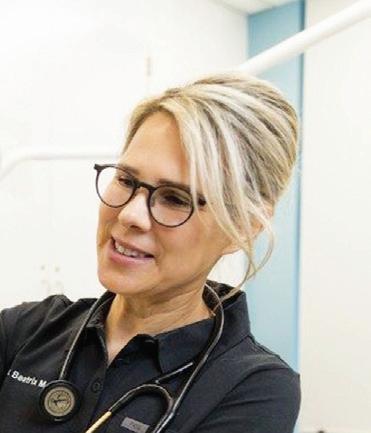
Care and Research Center (ACCRC) in Roanoke, one of the veterinary college's three teaching hospitals. Manning spent five years in private general veterinary practice before pursuing oncology.
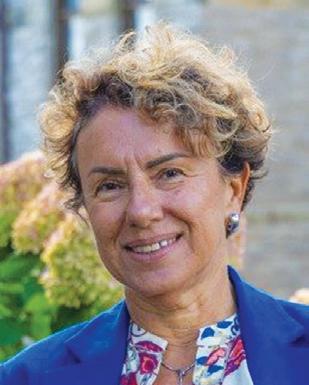
Laura Zanotti has joined Virginia Tech as chair of the the Department of Political Science. From United Nations peacekeeping missions to groundbreaking research on quantum entanglement in international relations,
Zanotti’s career has spanned continents and disciplines. She joined the department in 2006 as associate professor and was promoted to professor in 2019.
Tom Martin has been named as associate dean for strategic research advancement at Virginia Tech Carilion School of Medicine. He will support the school’s growing research enterprise, building crossdisciplinary teams, identifying funding opportunities, and supporting research training for faculty and students. The Smart Health Care Hub, funded through Virginia Tech’s Destination Area 2.0 program, will support collaborative research that connects technology, human-centered design, and clinical care. Martin’s recent experience includes a role as program director at the National Science Foundation.



Branch, one of the largest employeeowned construction firms in the Mid-Atlantic and Southeast, has announced a series of leadership changes. Jason Hoyle has been promoted to Chief Operating Officer (COO); Berton Austin has been promoted to executive vice president of Hopkins | Lacy, Branch’s commercial MEP division; and Colin
Have a career announcement?
Send announcements to news@vbFRONT.com Photos should be color, 300dpi. A contact / source must be provided. Inclusions are not guaranteed and all submissions are subject to editing.
Robinson has been promoted to executive vice president of the building division.
Jacob Quesinberry and Stephen Pendergrass have become equity owners and new partners in the leadership team of Poe & Cronk Real Estate Group. Quesinberry is a lifelong Roanoke native with experience as a developer, contractor, investor, and real estate sales, construction and project management. Pendergrass holds CCIM and SIOR designations and has experience as an advisor and top performer in the Southwest Virginia commercial real estate market.

Scott Thomasson has been appointed the new president of Layman Distributing. He represents the fourth generation of the family business and leadership, following WD Layman, Juanita Neely, and Judy Ross. Thomasson’s experience includes 20 years of working in nearly every department at Laymen, earning him a uniquely qualified, hands-on
understanding of the company. He has an MBA from Wake Forest University and has gained industry experience with Altria, Union Pacific Railroad, and Overnite Transportation. Still a division of the original Layman Candy Company, the Salem-Roanokebased operation the full-service business supplies wholesale food, consumer goods, and merchandise primarily to convenience stores, restaurants and related retailers, institutional dining, and grocers.
Karen Talley Mead has been appointed Chief Executive Officer


of Cardinal Bicycle. She served on the leadership team, including positions as marketing manager
and the fit program. Mead is an avid cyclist and competitive racer and will work alongside Cardinal Bicycle owner Whit Ellerman in guiding the business mission.
Doug Blount has been appointed as Deputy

County Administrator of Roanoke County. He was formerly Assistant County Administrator since 2022 and Director
of Parks, Recreation & Tourism before that. Blount is a Roanoke County native with 30 years of experience, including positions with Prince William County. He has a Bachelor of Business Administration from East Tennessee State University.
Compiled by Gene Marrano and Tom Field.
There are around 15,000 individuals just in the Roanoke Valley who do not have a high school diploma or GED. Page 20 “”


Linda Balentine is a Roanoke entrepreneur, founder, and owner of Crowning Touch Senior Moving Services as well as its transport, consignment, auction, and real estate portfolio. The business caters to the high growth senior citizen demographic and has been serving our regional market since 1996. [ linda@ crowningtouchusa.com ]
Phil Barbour is proudly rooted in Southwest Virginia, graduating from Patrick Henry High School and James Madison University. With more than 25 years of experience in financial services, he has risen from teller to branch manager—ultimately becoming a leader in Private and Business banking. He gives back through volunteer work with educational and nonprofit organizations. Barbour enjoys his time with his wife, two sons, an energetic Siberian Husky, and tackling endurance challenges, like the Marine Corps Marathon, Ironman 70.3, and Virginia 10-Miler. [ pwbarbour@ freedomfirst.com ]
Aila Boyd serves as the editor of “The Fincastle Herald” and “The Vinton Messenger” and coordinates social media for the Botetourt County Chamber of Commerce. She holds an MFA in writing from Lindenwood University.
Zachary Collier, Ph.D. is Assistant Professor of Management at the Davis College of Business and Economics at Radford University. [ zcollier@ radford.edu ]
Daniel Colston, CFP®, CEPA runs a tax and investing firm in Roanoke, Upward Financial Planning, specializing in helping business owners and retirees. [ daniel@upwardfp.com ]
Jennifer Poff Cooper is a senior correspondent for FRONT, and a graduate of the RB Pamplin College of Business at Virginia Tech with a Master of Arts in
Liberal Studies from Hollins University. She is a native of Christiansburg, where she lives and writes in her family’s home place. [cooperjp91@gmail.com]
Carrie Cousins is the Director of Digital Marketing at LeadPoint Digital in Roanoke. For 15+ years, she has helped businesses tell their stories and get better results online with practical digital marketing strategies. She also an active leader in AAF, serving on the local and district boards, and is an adjunct professor at Virginia Tech.
Doug Doughty is retired after spending 45 years at the Roanoke Times. After graduation from UVA in 1974, he was hired as a hockey beat reporter by the Roanoke Times. Many of his early assignments involved covering the Salem Pirates Class A baseball team when he witnessed — and later wrote about — the death of Alfredo Edmead in a collision with one of his Pirates teammates. Doughty later became the UVA beat reporter, covering football, golf, lacrosse and a host of other sports, including the Cavaliers baseball team when it won the NCAA championship with one of his sons on the team. Doug Doughty is also a member of the Virginia Sports Hall of Fame. [ doughtysports@aol.com ]
Dan Dowdy is the business development director for Valley Business FRONT and owner of The Proofing Prof proofreading services (proofingprof.net). His background includes service in the U.S. Air Force and an extensive career in education, including teaching college-level writing competency and business courses, and working for a Fortune 100 company. [ddowdy@vbFRONT.com]
Emily Field is the office administrator for Berryfield, Inc. (publisher of FRONT and a media / marketing firm). She lives in Salem with her
husband, Tom, and is the mother of three and grandmother of three. [ efield@berryfield.com ]
Tom Field is a creative director, marketing executive and owner of Berryfield, Inc. in Salem, and owner of Valley Business FRONT magazine. He has written and produced programs and materials for local and international organizations for 40 years. [tfield@berryfield.com]
Micah Fraim is a topreferred Certified Public Accountant and business finance strategist who is well-connected in the regional business community and nationally recognized. Publisher of The Little Big Small Business Book, he also publishes a blog at www.fraim.cpa/blog and is frequently interviewed as a business financial expert in national media channels. [ micahfraim@fraimcpa.com ]
Kevin Holt is a partner at Gentry Locke’s Roanoke office where he has worked since 1998. His specialty practice area is commercial, real estate, intellectual property, and ERISA (Employee Retirement Income Security Act) litigation. He enjoys supporting and attending games of his two sports-active daughters and enjoys traveling (visiting 27 countries and 38 states).
Olivia Marone is a seasonal contemporary portrait photographer with over two decades of experience. While she has worked in a variety of photographic settings, her true passion lies in the studio. With expert facial coaching and a knack for helping clients feel at ease, she ensures you look your absolute best. [ olivia. marone@gmail.com ]
Gene Marrano is FRONT editor and an award-winning anchor and reporter for WFIR Newstalk radio. "Best one on one interview" award from Associated Press of
the Virginias for his interview with former Roanoke County Chief of Police Howard Hall. [gmarrano@cox.net]
Mary Ann L. Miller is vice president of business banking and community relations at Bank of Botetourt. A graduate of Bridgewater College, she has been in the banking industry for more than fifteen years and currently serves on the board and executive committee as past-president with the Botetourt County Chamber of Commerce, a board member with the Daleville Institute, and is vice chair of the board of with the Botetourt Family YMCA. A native of Botetourt County, she resides in Daleville with her husband and two children.
Alicia Smith is vice president of F&S Building Innovations in Roanoke. She grew up in the construction business and has served in multiple capacities, currently managing all sales, design, production and marketing of the residential division. She's also the president of Build Smart Institute and serves on several boards, community and church organizations. Alicia enjoys lake-life living and fun times with her family (husband and two daughters) and friends.
Nicholas Vaassen is a graphic design specialist with over a million years of experience. His design projects include logos, magazines, web design, signs, newsletters, postcards, business cards, and any other marketing materials you can think of. [ nicholasvaassen@ gmail.com ]
Jamie Wigand is a senior consultant with Building Beloved Communities. She is a Certified Association Executive and works with membership committees, events, med-tech-bio-finance transitions and scaling, succession planning, and recruitment.








Grand Ol’ Lady on block
The Hotel Roanoke is being put up for sale by the Virginia Tech Foundation. A combined commission (with Roanoke City and Virginia Tech) own the Conference Center—its ownership status from a sale could change but is unknown at this time.
Speaking of popular icons
Roanoke’s Civic Center (currently named the Berglund Center) could be the new site for an entertainment complex, anchored by a casino, city council announced on Oct 14. The City’s study and consideration has received far more criticism than support— at least in the early stage.
Popular hangout becomes new hangout
The Haven—a new restaurant with American fare lunch, dinner, drinks, sports bar, and live music—is opening later this year at the former Awful Arthur’s seafood and pub at Roanoke’s downtown market area.
Outstanding in their fields
Roanoke College was ranked 10th in the nation for “Best Athletic Facilities” by The Princeton Review.
Uncommon leadership in Commonwealth Area Development Magazine ranked Viriginia number 1 for “workforce training programs” in its 2025
report, citing the Virginia Talent Accelerator Program and job security at larger institutions.
R&D’ing and distributing in NRV
Onward NRV (regional economic development organization for New River Valley) awarded its 2025 Regional Impact designations to Patton Logistics (Pulaski County company investing $10 million and 25 new jobs) and Luna Labs (Montgomery County company investing $260,000 and adding 8 new jobs).
Takin’ our stuff to the shed
Crafteria—an interior bazaar for local crafts— is moving (from Church Ave, downtown Roanoke) and changing its name to Woodshed: Appalachian Crafts and Coffee Café. The new location should open in early 2026 at 409 S. Jefferson Street.
Tapping a leader
Total Action for Progress (TAP) selected Pamela Irvine, CEO of Feeding Southwest Virginia as its 2025 Cabell Brand Hope Award winner. Cited was Irvine’s leadership in expanding from a one-room food bank to a “regional lifeline distributing 20 million pounds of food each year.”
management service for Roanoke’s Hunting Hills Country Club
Governor Board Appointments
Statewide Independent Living Council: Garrett Brumfield of Roanoke, Founder, Overcome Yours; Advisory Committee on Juvenile Justice and Prevention: Jake Petzold of Roanoke, Special Program Manager for Restorative Housing, Virginia Department of Corrections; Board of Medicine: Dr. Jennifer Rathmann of Blacksburg, Chiropractor/ President, Tuck Chiropractic Clinic.
GO Virginia grant
$2.8 million in Growth and Opportunity for Virginia (GO Virginia) grants have been issued for 10 projects that strengthen regional economies, expand talent pipelines, and prepare sites for future business investment. The awarded projects leverage an additional $1.2 million in local and non-state funding. Included is an NVR Site Advancement Strategy for $94,400 for the Region 1 Counties of Floyd, Giles, Montgomery, and Pulaski and the City of Radford. The New River Valley Regional Commission will help evaluate five local sites and one regional commerce park for industrial development.
been ranked No. 1 in the United States in Area Development’s Top States for Doing Business report. This comes on the heels of Virginia’s Talent Accelerator Program also being ranked No. 1 in the United States in the annual Business Facilities Rankings Report for the third consecutive year. In addition to workforce training, Virginia ranked No. 7 overall in the Top States for Doing Business report, moving up two spots from last year.
JA to recognize business leaders
Junior Achievement of Southwest Virginia presents its 2025 Southwest Virginia Business Hall of Fame inductees, to be cited at the Hotel Roanoke & Conference Center in early November. This year’s Laureate Inductees are Nicolas Conte, Esq., Executive Vice President and Chief Legal Officer at Carilion Clinic, and Paul Nester, President, Chief Executive Officer, and Director of Roanoke Gas Company. JA will also recognize Jason and Carolyn Kiser, founders of Roanoke-based Blue Cow Ice Cream Co., and Dr. Jaclyn Nunziato, co-founder of Huddle Up Moms, as Entrepreneurs of the Year for their creativity, innovation, and dedication to strengthening the region.
HHCC’s new operator
Scottsdale, AZ-based Troon—a mega golfhospitality management group—is the new
Workforce training program recognized
Virginia’s workforce training program has
VVBR touts tourism growth in region
Visit Virginia’s Blue Ridge (VBR) hosted its first Tourism Research Summit last month at
The Hotel Roanoke & Conference Center. According to the Virginia Tourism Corporation and Tourism Economics, visitors spent a record $923.1 million in Virginia’s Blue Ridge in 2024 — a 4.6% increase over 2023 and 24.9% higher than pre-pandemic levels. This direct visitor spending generated $44.6 million in local tax revenue, supported 7,418 jobs, and resulted in $347.38 in local tax savings per household across the region. VBR’s “Vacation Starts with VA’s Blue Ridge” spring marketing campaign delivered over 52.9 million impressions, 620,000 website visits, and 5.3 million digital engagements, helping drive a new annual record of 2 million unique visitors to VisitVBR.com. Sports tourism was another key focus, including the 2025 USA Cycling Endurance Mountain Bike National Championship this past July, which generated an estimated $2.6 million in visitor spending and raised funds for local nonprofits and trail maintenance projects.
Almost 1300 unique athletes and 44 states were represented, with 15,000 spectators at three venues. Visit Virginia's Blue Ridge Vice President of Sports and Sales John Oney said it was also the people behind the scenes that made it all work: 357 volunteers worked 475 shifts. The event, which also took place at Elmwood Park and Carvin's Cove, will return here in 2026.
Five new companies were accepted into the Fall 2025 cohort of Roanoke and Blacksburg’s technology and life science accelerator, the Regional Accelerator Mentoring Program’s RAMP In Residence: The Music Advocacy Project (live music support for independent venues, artists, agents, and promoters); Back to Eden Infant Formula (minimally processed, whole food-based infant formula); Anthro Systems Limited (custom 3D-printed
Send announcements to news@vbFRONT. com. A contact / source must be provided. Inclusions are not guaranteed and all submissions are subject to editing.
bicycle helmets); Strokes of Genius, LLC (learning experiences through an immersive testing platform); Milkmade (smart device that measures breast milk in real time). After going through a 12-week program all five startups in the Fall 2025 RAMP cohort will present their products at a demo day with prospective investors in the audience.
Roanoke County students tour local businesses
MFG Day, celebrated annually on the first Friday in October, is a nationwide initiative led by the Manufacturing Institute that highlights the future of modern manufacturing careers. Roanoke County
Economic Development partnered with Roanoke County Public Schools Career & Technical Education Department and the Greater Roanoke Workforce Development Board to connect more than 200 students with local manufacturing careers. Tours included New Millennium, Novonesis, P1 Technologies, Medeco, Wabtec, Valcom, Mack Trucks RVO and Marvin.
Major workforce grant
The Appalachian Regional Commission (ARC) has awarded the New River/Mount Rogers Workforce Development Foundation, whose board is based in Radford, a $500,000 grant for workforce development to support

the training of 200 individuals, service to 100 businesses and eight workforce development initiatives. Project “Workforce Ready” will expand training and credentialing opportunities throughout Bland, Carroll, Floyd, Giles, Grayson, Montgomery, Pulaski, Smyth, Washington and Wythe Counties and the cities of Bristol, Galax and Radford.
Holiday Inn Tanglewood in Southwest Roanoke County announced the grand re-opening of its property last month, following a multi-milliondollar renovation, which included modernized guest rooms with updated furnishings, premium bedding, and technologyfriendly amenities; reimagined lobby and public spaces; upgraded meeting and event facilities with the latest technology, a refreshed on-site restaurant and bar and sustainability upgrades that include energy-efficient systems and eco-friendly practices throughout the property.
The Advanced Research Projects Agency (ARPA-H) has awarded Virginia Tech $39.9 million to support development of a new biosensor that enables real-time, ultrasensitive detection of specific pathogens and allergens using nanobody-based technology. The funding is supported by the agency’s Building Resilient Environments for Air and Total Health
(BREATHE) program, which aims to advance the next generation of smart and healthy buildings. Groups also selected to participate in the program include the Mayo Clinic, Poppy Health, Inc. and SafeTraces, Inc.
Cox steps up again
Cox Communications employees have awarded a total of $15,000 in grants to three local nonprofits, through Cox Charities Community Investment Grants. The program provides employee funded grants of up to $5,000 to support special programs benefiting residents in the area. This year’s recipients of the grants are Boys & Girls Clubs of Southwest Virginia, Inc., The Hope Center on 11th Street NW in Roanoke (to support its Community Economic Empowerment Series,) and Total Action Against Poverty in the Roanoke, to support TAP’s new youth employment initiative, Project Discover U, which provides paid work experience, professional development, and mentorship for up to 50 youth ages 14–24.
The Roanoke Foodshed Network (RFN) has granted $18,000 to area nonprofits and schools to support food access work in the Roanoke region. The following organizations received funding: Roanoke Refugee Partnership, East Salem Elementary School, One Valley, Inc., Busk Roanoke, Virginia Cooperative Extension, Local Environmental
Agriculture Project, West End Center for Youth, Roanoke Healthy Hearts and Cave Spring Elementary School PTA The funding was made possible by the Virginia Foundation for Healthy Youth’s (VFHY) Healthy Communities Action Teams (HCAT) grant.
A children’s bookstore and workshop will soon be open, giving residents with intellectual disabilities a chance to show they belong in the workforce. 3 Balloons is set to open in November at the corner of Franklin Road and McClanahan Street SW in Roanoke. Director Steve Stinson is a commercial artist and author (and a sometimes community theater actor) says when the grand opening takes place, his employees who have intellectual challenges, including autism, will be the stars of the show: “everybody wants to be useful, and it’s very hard for people with ID to find good jobs. The whole point is to give people a place where they make something that they’re proud of – and they are.”
Getting older can be expensive in Roanoke area
According to a survey conducted by CareScout, a division of Genworth Financial, assisted living in the Roanoke area runs about $73,000 annually—that’s about $2000 less than the national average. Matt Turner is Chief Operations officer for CareScout: “we’re trying to start the conversation. We do the largest survey
of its kind nationwide. By educating Americans out there, I think there’s a wakeup call about how expensive it actually is. We’re trying to get folks to consider going through that planning process.” In the Roanoke area the CareScout survey reveals private nursing home rooms run more than $132,000 annually on average— even a home health aide averages nearly $60,000 a year. For those seniors that do not qualify for Medicaid coverage, those numbers may be a real eye-opener.
Martin’s recognized
The impact one local restaurant has had on downtown Roanoke and its revitalization over the past two decades was celebrated in late September. The locally owned Martin's Downtown opened in 2005, and owner Jason Martin was surprised when Roanoke Mayor Joe Cobb declared September 27 "Martin's Downtown Day," from the stage at Martin’s no less, adding that the eatery/live music venue is, "enriching the life of the city of Roanoke ... a vibrant hub of dining and entertainment … a thriving destination."
Williamson Road experiment underway
The next phase of Roanoke’s "Envision Williamson Road" project has begun. The goal is to improve safety along the Williamson Road corridor and make it more pedestrian-friendly. The six-month demonstration has adjusted travel lanes on a stretch of Williamson
Road, going from two lanes each way to one and adding a center turn lane. Valerie Brown is executive director for the Greater Willamson Road Area Business Association: “our hope is to be able to bring Williamson Road back to the way it was in its heyday, when it was a shopping mecca, it was a place you wanted to go, a place you wanted to stop and visit and spend your money … now, by and large, people just use it as a connecting road between [Roanoke City and Roanoke County].” The road was re-striped—no cones or barrels. The Envision Williamson Road project will be reassessed
after six months to see if it should be made permanent, or if any tweaks are needed. Reaction to the Envision plan from the locals has been mixed early on.
Roanoke County has been working with a consultant to formulate a Housing Market Analysis Study on the issue of the housing shortage, affordable housing, limited inventory, skyrocketing construction material costs. Kyle Talente is with RKG Associates: “the first part of it is looking at it from a demand perspective. Demographic data,
existing residents—not just in the county but in the region—trying to understand all the facets of household size; are there specific needs within the socioeconomic analysis?” Final results of the county housing market study will be presented to the public during a webinar sometime this winter.
Homeplace stays Homeplace
The Homeplace Restaurant in Catawba will reopen under the same name, according to the new owners. Closed for five years after being sold by the Wingate family, the reopening
(with most of the same menu intact) is good news for patrons of the popular venue. Noah Beckley and Andy Mullins hope to open by Easter 2026, and say they are also adding monthly specials, expanding hours, offering breakfast and lunch on weekends, while preserving the “nostalgia” that made Homeplace such an attraction.
Minimum wage increase
Virginia’s minimum wage will increase to $12.77 per hour effective January 1, 2026. It’s a 2.9% increase from the 2024 Consumer Price Index.
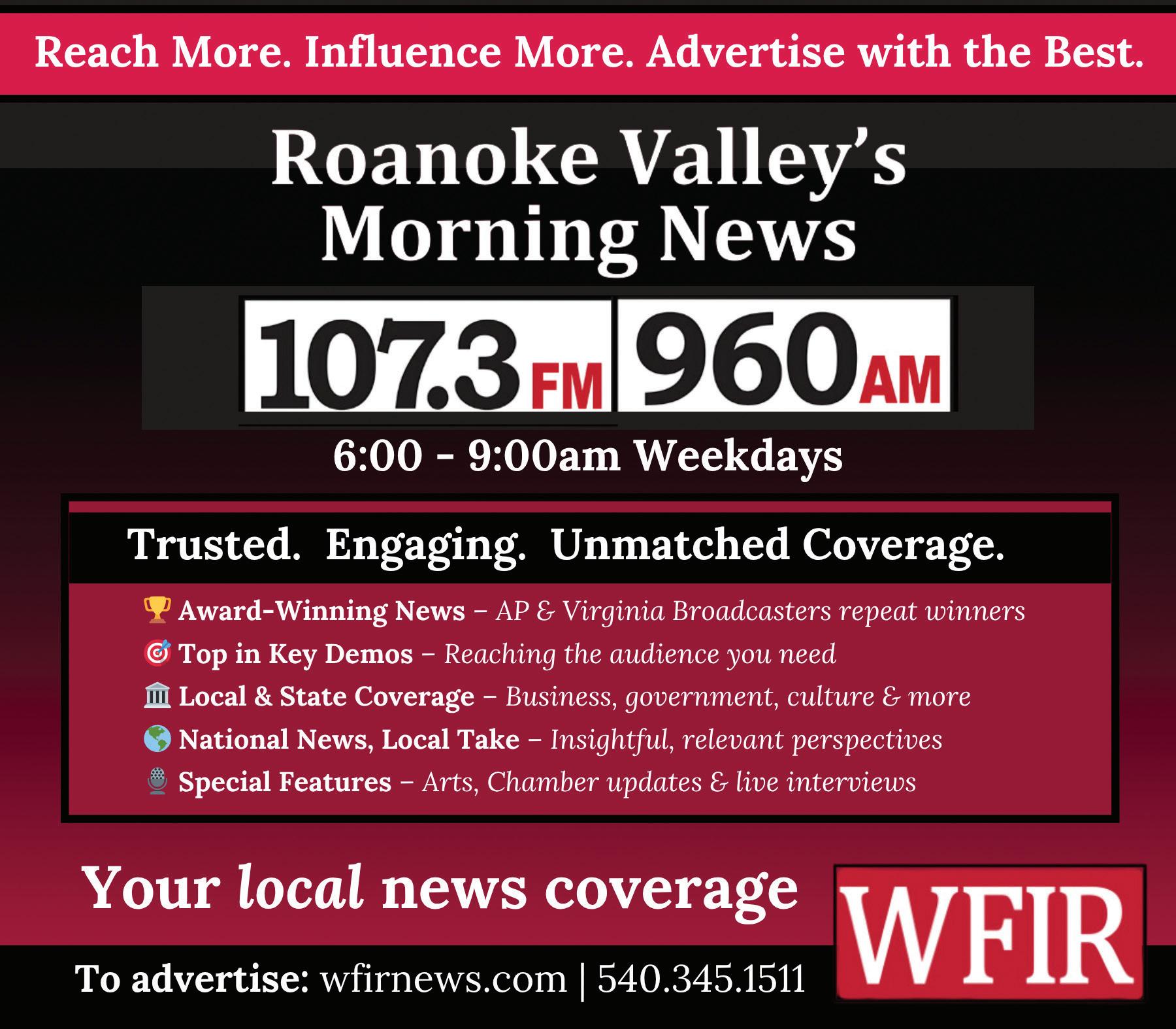

By Gene Marrano
A 32 year old “best kept secret,” walk in program in Roanoke for those grappling with substance abuse order aims to get participants back on track.
Putting the impact of drugs and substance abuse into dollars and cents on national productivity, healthcare systems, and public safety, the National Institute on Drug Abuse pegs that number at more than 700 billion dollars a year. The CDC states that opioid abuse alone accounts for 80 billion of that amount. Substance abuse impacts absenteeism, performance and of course leads to unemployment that affects families and community decline.
Roanoke author Beth Macy saw that as she researched her latest book, Paper Girl, a memoir of the journalist’s life that also detailed how substance abuse had led to a decline in her hometown of Urbana, Ohio. In Roanoke over the past few years several residential treatment centers for people trying to shake opioid abuse have opened up, and at least one more (a former office space for New Horizons Healthcare
near Valley View Mall) has been proposed.
On Our Own of Roanoke Valley Inc. has been around for more than three decades, offering non-residential substance abuse treatment and counseling during mostly afternoon hours, helping clients get back on track and ready to rejoin mainstream society, reconnect with family, go back to work, etc.
The non-profit On Our Own recently cut the ribbon on its new home on 2nd Street SW in Roanoke. Executive Director Robin Hubert knows all to well what it's like to be in the grips of substance abuse: she’s been there and is a recovering addict herself. On Our Own is a “safe space,” she says, one that provides counseling and at no cost –those seeking help can just walk through the doors. “Everyone who works there is in recovery. Come in, hang out or participate.”
There are group activities and support groups available.
“It’s a family atmosphere and we welcome everybody.” Hubert says they start by asking participants to look at their strengths, giving them a baseline before working on their substance abuse issue. “So many people have experienced trauma.”
Many others who are involved in substance abuse treatment programs are Peer Recovery Special Specialists (PRS), and On Our Own is now working with George Mason University on a new PRS Workforce Program, where one of the prerequisites is that the applicant must have experienced substance abuse and then recovery. The George Mason initiative offers a stipend for the nine month PRS Workforce training.
That new program is scheduled to start this month, with classroom training before internships as a PRS begin in January. Hubert also trains Peer Recovery Specialists for the Commonwealth of Virginia. On Our Own is one of the preceptor sites for the George Mason program, which offers job skill training and a $6000 stipend for interns. It all leads to certification testing and a new career track. The positive impact of Peer Recovery Specialists “is evidence-based,” notes Hubert.
A federal block grant passed through a state agency, provides the bulk of funding

for On Our Own, which staged a Celebration of Recovery gala and fundraiser last month. The keynote speaker was Janine Underwood, executive director of the Bradley Free Clinic, and founder of the walk-in, no questions asked Hope Initiative, for those ready to take the next step, seeking to recover from opioid abuse. Both Underwood and Hubert lost sons to an overdose.
Hubert says federal funding has been extended for On Our Own, although she knows of programs that lost their funds with recent federal cost cutting. Word of mouth about “the best kept secret in Roanoke,” and referrals from Blue Ridge Behavioral Healthcare, RAM House, local hospitals, etc. send people to On Our Own. Hubert says the “very small,” non-profit, with a staff of five, has been trying to raise its profile a bit in recent years.
On Our Own is open on holidays for those with nowhere else to go, a space for those in recovery to bond over similar experiences. “We’re there for support,” says Hubert, noting the many hats she often has to wear. “My passion is fueled by my grief and my loss – I don’t want anyone to have to go through this, or a family, or close friends.” Lending a sympathetic ear, a place to not be alone. “You don’t ever have to be alone again. You can come every single day. We get 25 to 30 people a day [at On Our Own]. You come and go as you please.”





